#Doctor Who expert commentary
Explore tagged Tumblr posts
Text
Doctor Who: The Legend of Ruby Sunday Review | Earth Station Who
New Post has been published on https://esonetwork.com/doctor-who-the-legend-of-ruby-sunday-review-earth-station-who/
Doctor Who: The Legend of Ruby Sunday Review | Earth Station Who

Dive headfirst into the Earth Station Who Podcast as we unravel the thrilling Doctor Who episode, “The Legend of Ruby Sunday.” Everything this season has been building up to this captivating moment! Join hosts Mike F., Mike G., and Mary, along with special guests Shannon Clute, Charles Martin, and Chip Johnson, as they dissect the episode’s exciting plot, intriguing character developments, and key themes. Uncover the mysteries of Ruby Sunday and explore the looming darker evil threatening the entire Doctor Who universe. Whether you’re a dedicated Whovian or a newcomer, our lively discussion and expert insights will keep you hooked. Don’t miss out on the adventure—tune in now to the Earth Station Who Podcast for an in-depth review of “The Legend of Ruby Sunday” and all things Doctor Who!
We want to hear from you! Please write to us at [email protected]. Also, please subscribe and rate the show on iTunes, Amazon, YouTube, or wherever fine podcasts are found. Feedback is always welcome and much appreciated.
Links Listen to older episodes of the Earth Station Who Podcast ESW on iTunes Earth Station Who on Spotify Earth Station Who on Instagram Earth Station Who on Facebook Earth Station Who on YouTube Make-A-Wish Foundation The ESO Network TeePublic Store The ESO Network Patreon
Promotion Modern Musiccology
#EarthStationWhoPodcast #DoctorWhoLegendofRubySunday #LegendofRubySundayreview #DoctorWhoepisodereview #RubySundayDoctorWho #DoctorWhoSeason14 #DoctorWhopodcastdiscussion #Whovianpodcast #LegendofRubySundayanalysis #DoctorWhocharacterdevelopments #DoctorWhoplotbreakdown #TARDISadventures #EarthStationWhoreview #DoctorWhoepisodeinsights #DoctorWhofanpodcast
#chip johnson#Doctor Who#Doctor Who character developments#doctor who episode insights#doctor who episode review#Doctor Who expert commentary#doctor who fan podcast#Doctor Who Legend of Ruby Sunday#Doctor Who mysteries#Doctor Who plot breakdown#doctor who podcast discussion#Doctor Who Season 14#doctor who universe#Earth Station Who#Earth Station Who Podcast#earth station who review#ESO Network#ESW#Legend of Ruby Sunday analysis#Legend of Ruby Sunday review#Legend of Ruby Sunday themes#Mary Ogle#Michael Gordon#Mike Faber#Ruby Sunday Doctor Who#Ruby Sunday mysteries#Shannon Clute#tardis adventures#whovian podcast
0 notes
Text
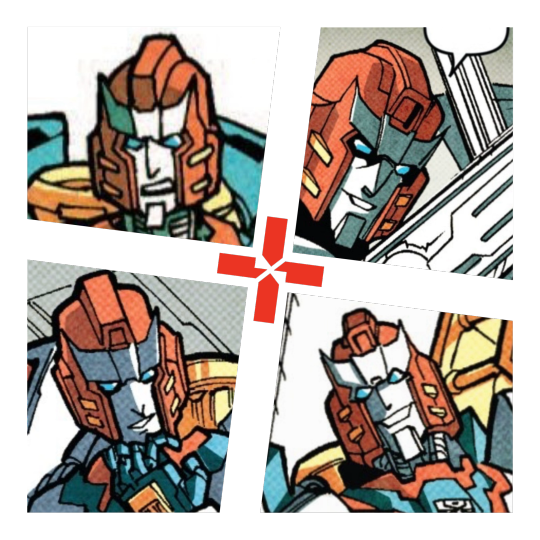
Medic, Maverick, Maniac, Murderer: Understanding Pharma
First thing’s first: I love Pharma, dearly.
In all the time I’ve spent evaluating his character, I’ve mainly focused on what can be worked out about who he is as an individual: his core sense of self, psychological drives, subjective worldview, etc.
When all else is stripped away, who is Pharma?
This treatise is the product of obsessing over Pharma, analyzing canon (and extras), and reading as many different perspectives on his character from fans across the fandom as I could find. The post is long, so for those of you who balk at the thought of reading a shortfic’s worth of Pharma thoughts, feel free to read the TL;DR (Conclusion) at the end and then decide if the full read is worth your time. Also, a premium reading experience is available in the form of the original Google Doc version.
As you read, keep in mind that this is primarily a mix of psychoanalysis, evidence-based examination, and speculation—not moral, ethical, or sociological commentary. The goal is to examine Pharma’s psychological drives and core values, and each of his appearances in the context of those. All other types of evaluation are up to readers.
Now, take your victim blaming-allergy meds (just in case); remove your black-and-white thinking caps; and leave your personal morality lenses at the door.
Psychological Drives & Core Values
Why does Pharma act the way he does? What gives him a reason to keep living? What are his personal priorities?
At the beginning of the Delphi arc, First Aid establishes Pharma as a “control freak” and someone who “thinks he’s an expert on everything.”

Now, First Aid has a habit of complaining about his bosses, but on both points, there’s canon evidence to back them both.
Expertise and Intellect
Throughout the Delphi and Luna 1 arcs, it’s established that Pharma is a skilled and brilliant doctor.
He once performed a 4-way fuel pump transplant, donating his own fuel pump in the process. (see above panel)
Later, he invented a soundbomb that left an echo laced with a virus and invented an antidote to that virus:
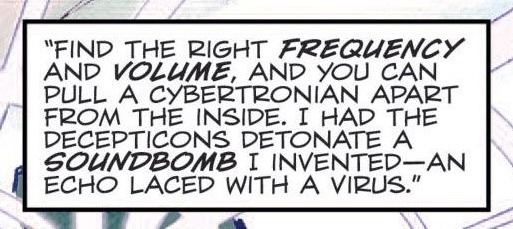
And on Luna 1, he was on the edge of finding a cure for Cybercrosis, based on the fact that Swerve was able to formulate a cure from his notes.
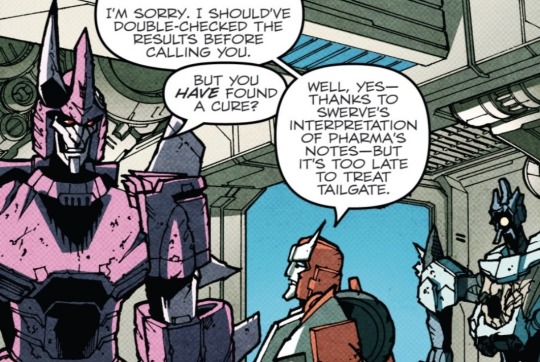
More than being a doctor, Pharma lives for intellectual and scientific achievement as a physician scientist. He feels most alive when he’s able to solve complex medical problems, and when his achievements are recognized by those whose opinion he considers important.
This is Pharma’s 'why.'
And even though he’s arrogant and enjoys praise, it’s not his primary motivation. He doesn’t need it in order to set his mind to whatever he’s interested in, although he’ll seek it from those he values most (i.e. Ratchet).
Pharma sees himself as less of a doctor, and more as a scientific innovator or medical maverick. The practice of medicine is primarily a catalyst for his creativity and intellect; it’s not an end in and of itself like it is for someone like Ratchet or First Aid.
First Aid’s observation of Pharma can be better phrased as, “[Pharma] thinks he’s an expert on everything medical”—because he’s not so driven by achievement and admiration that he’ll grovel at the feet of strangers and get good at something he doesn’t personally find interesting. The only time we see him express a desire for praise is when he’s around Ratchet—someone he holds in high regard for both personal and professional reasons. This makes sense since Ratchet is one of the only people who can give Pharma any kind of competition within what he considers to be his area of expertise.
“Each day we go to our work in the hope of discovering—in the hope that some one, no matter who, may find a solution of one of the pending great problems—and each succeeding day we return to our task with renewed ardor; and even if we are unsuccessful, our work has not been in vain, for in these strivings, in these efforts, we have found hours of untold pleasure, and we have directed our energies to the benefit of mankind.” —Nikola Tesla
Ego
Without question, Pharma has an inflated ego, but having an inflated sense of self doesn’t automatically mean a person is a full-blown narcissist or that they are totally uncaring.
Every personality trait exists on a spectrum. Yes, Pharma is arrogant, but the presence of arrogance doesn’t automatically and completely cancel out all “positive” traits. (For fun, check out studies on Dark Tetrad and Light Triad personality traits.)
People are complex. Arrogance can coexist with genuine kindness, ruthlessness can coexist with deep compassion, etc.
Whether Pharma exhibits genuine kindness is up to each reader’s interpretation of what little canon material exists, but the point is: Pharma’s arrogance doesn’t automatically rule out the possibility of authentic “positive” traits.
Controlling Tendencies
Pharma is comfortable pulling the power card and using it to dump what he sees as uninteresting parts of medical practice on those below him:
“So Fisitron’s writing about the Wreckers’ elbows now, is he?” said Delphi’s Chief Medical Officer. “Come on, First Aid - get to it. You’ve got a Fader in Row 2 downstairs.” He squeezed the air with his finger and thumb. “He’s about this far from shutdown.” —from Bullets by James Roberts
However, there’s nothing in canon indicating he’s power-hungry in a megalomaniacal sense. He’s not Starscream or Megatron; he doesn’t seek political or social power. In fact, he seems perfectly happy hiding away in a lab or medibay by himself so he can direct all his energy toward solving issues and achieving the so-called ‘impossible’ within the field of medicine:
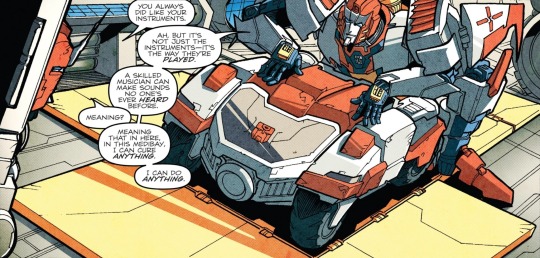
The ways in which Pharma exercises power and control are through his expertise, and his administrative/management skills. That’s it.
Self-confidence
Pharma’s arrogance and controlling tendencies don’t seem to be a mask—like he’s trying to compensate for some sense of lack (in those areas). Yes, he fears failure, and yes, he displays some insecurity when Ratchet questions his competence. But at every other point and in every other way, Pharma is unapologetically self-confident. He’s fully self-assured of his intellectual prowess and problem-solving capabilities; he knows what he knows, and he also knows what he doesn’t know.
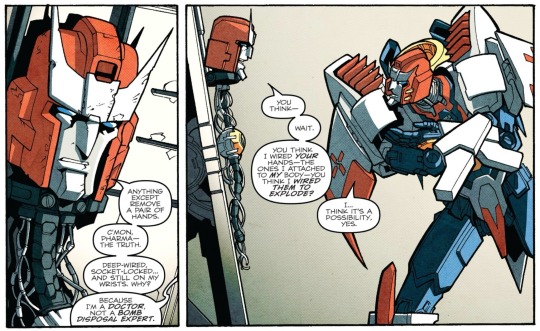
Pharma’s arrogance and desire for control don’t stem from a hidden lack of confidence or a hunger for power on its own. They stem from the fact that he genuinely sees himself as the best person for the work he does. He trusts himself above anyone else to solve problems that come his way—medical or otherwise (within limits).
Elitism vs. Superiority
I’ve always read Pharma as having an elitist attitude, but not in the social stratification sense:
elitist (adj.) relating to or supporting the view that a society or system should be led by an elite.
There’s no evidence that Pharma believes an elite class of people should hold the most power. Instead, Pharma’s “elitism” is actually an individualistic sense of superiority. It’s centered on him alone, and is tied to his capabilities as a physician scientist and surgeon.
Pharma sees himself as the best of the best and makes sure everyone knows it—sometimes through his words, but mostly by his conduct in the field of medicine. This, paired with Pharma’s natural temperament, doesn’t exactly make him socially popular—inside or outside of medicine:
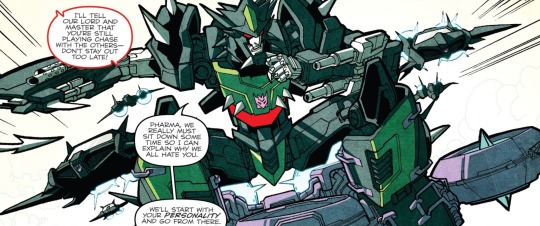
One could argue that the “personality” Lockdown is referring to was a result of all Pharma had suffered at Delphi and Luna 1, but just as easily, one could argue he was always a bit difficult to get along with, and that his traumatic experiences merely magnified his already-present psychological patterns. Personally, I like the latter interpretation because it’s a flaw that makes Pharma a more interesting character no matter his mental state.
Everyone reacts differently to real and perceived social rejection. Some are so concerned about it that they’ll try anything to belong; others genuinely don’t care, and they continue as usual; and still others cope by shifting their mindset and developing a sense of pride in being an outsider.
There’s no evidence for this in canon, but I believe it’s within reasonable characterization boundaries to headcanon Pharma as being in the second or third category.
With either of those two mindsets, a sense of superiority can develop, or even be an inciting factor. Either someone sees themselves as genuinely superior to the majority and doesn’t mind when this alienates them from people, or they convince themselves they’re superior because the pain of accepting they were rejected for who they are is too much to handle.
Whatever the case, the point is, having an “elitist” attitude isn’t necessarily rooted in a sociological or ideological belief. Sometimes, individuals just see something in themselves that—to them—justifies a sense of personal superiority. A quick glance at Pharma’s canon appearances makes it clear he holds such a view of himself, at least to some degree.
Morality and Compassion
When Pharma first shows up in canon, he’s working at the New Institute. A lot of questionable things took place there on a regular basis—things Pharma would have been aware of, to some degree. However, his presence at the Institute doesn’t automatically mean he agreed with everything happening. Depending on how strongly someone feels about something, some people are content to disagree in silence. Not everyone who seeks employment considers it a priority that the establishment they work for aligns perfectly with their moral values. After all, there are other reasons to take a job: financial benefits, exclusive educational and career opportunities, pure convenience, etc.
I’m not here to say either way whether Pharma’s willingness to turn a blind eye to the events at the New Institute was wrong or right; that’s up to each reader to decide for themselves. However, Pharma’s choice to remain employed at the Institute for some time can say something about him as a character: his priority as a doctor and person is not to take care of everyone he encounters, or to act as some kind of moral or ethical authority.
This isn’t to say Pharma won’t ever stand up for something he regards as right or push back against something he sees as wrong, “off screen.” It’s just that everything in canon points more to a tendency to choose his battles instead of acting immediately on any moral sense the way someone like Optimus or Ratchet might.
This also isn’t to say Pharma doesn’t care about saving lives, but from what little is shown of him before Delphi, it’s hard to say how much he cared. Ratchet confirms later that Pharma was an excellent doctor for most of his life, but all that tells us is he was an excellent doctor; it says nothing about his internal attitude toward his work or patients.
However, inferences can be made based on doctors in our own world:
Being a doctor—especially one in trauma care—is far from easy. It takes a lot out of a person, and there are very few people who last in the profession for a long time. Most medical professionals fall into one of the following categories:
People possessing a strong will that’s coupled with an unwavering passion for taking care of others (the public’s favorite)
People who naturally have, or develop, an ability to switch their empathy off and on at will, or build walls around it—also possessing a strong will (the ideal)
People who naturally have a limited capacity for empathy (the one the public hates to acknowledge)
People with a strong social and professional support system (the necessary, but underutilized and underappreciated factor)
Of course, even if a person has one or more of the above, burnout can and does still happen, but individuals who have at least one have the best chances of surviving and thriving amidst the demands of the majority of medical professions.
As far as is shown in canon, Pharma never had a strong support system—either circumstantially or by choice—so something else was keeping him in medicine.
Pharma shows concern for both Tumbler (Chromedome) and Hubcap:
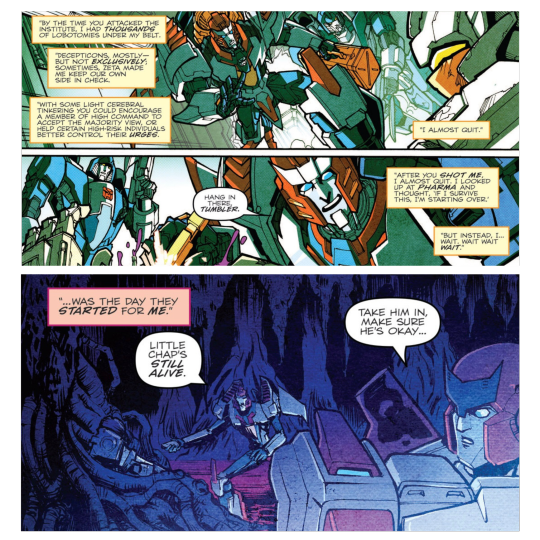
But even though he obviously cared enough to step in, neither instance makes a strong case for a capacity for empathy beyond the “average” or “norm.” Performing a job well is a lot different from being personally invested in the work.
Based on everything up to this point, and this later comment from Pharma, about Ratchet…
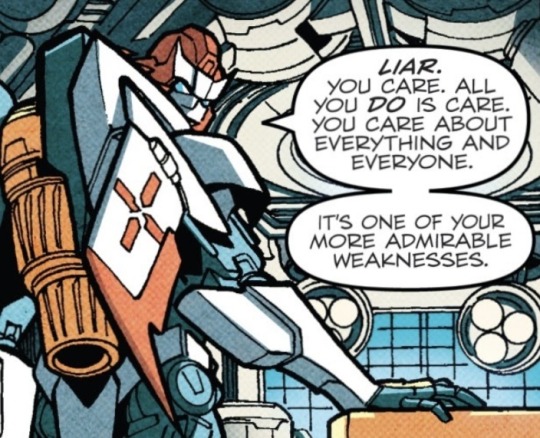
…Pharma has probably never shared the same I-care-about-everything-and-everyone view of the world. Instead, it’s more likely that Pharma holds a more rational view of his work and patients.
One of the first things learned in medicine, especially in trauma medicine, is that you can’t help or save everyone, and to hold yourself to that standard can destroy you quickly if you have a certain temperament or lack healthy boundaries for your empathy.
“There are times when it may seem as though I view sick or injured people not as living, breathing humans with feelings and emotions and people who love them, but simply as cases, as problems to be solved. And that is absolutely true. It's not that I don't have empathy, but the hard fact is that as a doctor, and especially as a trauma surgeon, too much empathy can get in the way of your job and cause you to make decisions based not on sound medical judgment but on your own emotions. Sure, I've seen things that even years later can still make me choke up when I think of them: a little girl shot and killed, a shattered young Marine who shouldn't have died but did. But you can't choke up in the ER or the operating room. To be effective as a trauma surgeon, you have to put a layer of Kevlar around your heart.” —Dr. Peter Rhee, Trauma Red: The Making of a Surgeon in War and in America’s Cities*
Pharma may have learned this difficult truth earlier than Ratchet and developed a practical way of managing his empathy that comes across as “cold.” He may have always had an ability to put up walls around his spark. Or, he may have always had little to no capacity for empathy.
The fact that the morality lock on Tyrest’s portal prevented Pharma from passing through proves he felt guilty for what he’d done, and JRO confirmed this. Therefore, it’s safe to assume Pharma had some level of empathy for his former patients, suffering moral injury when he felt he had no other option but to start killing them.
Still, looking at Pharma’s psychological drives and his behavior throughout canon, it’s clear compassionate care and morality are subordinate to his other values and interests.
*I highly recommend this book, and learning about Dr. Rhee in general. He’s a huge inspiration of mine, and one of my main sources of inspiration when writing Pharma. Level-headed and capable, strong-willed, selectively empathetic, an excellent scientist, etc. He lives for the thrill of practicing medicine both on the floor and as an expert in his field who pushes trauma medicine to new heights through his research. He also takes great pride in his hands. Seriously—the man spent an entire paragraph and a half talking about his “good hands” and how they were one of two reasons he decided to go into trauma surgery. The other reason was that he “liked action and excitement, liked the feeling of being able to walk into a tough situation and take control.” (Sounds familiar…)
Delphi
First thing’s first: we don’t know how much Pharma did or didn’t know about the DJD before agreeing to take the Delphi assignment.
That far into the war, he would have known something about the DJD and their ways of terrorizing traitors and Autobots, but for whatever reason, he took the assignment anyway. Perhaps Prowl assured him the situation on Messatine would be monitored and that the security team would be enough. Perhaps he underestimated the DJD’s capabilities, or scale of territory, and thought he would be able to handle things on his own. Perhaps Prowl gave him no choice. Maybe it was all of these and more.
Whatever the case, according to JRO, Pharma didn’t hate Delphi before the incident with the DJD.
Word of god remains a touchy subject in fandom, but in this case, it’s important because it says two things:
The DJD left the Delphi medical team alone for some time.
Being on the edges of DJD territory didn’t automatically mean isolation and harassment by their hand.
On the second point, First Aid was free to come and go from Messatine as he pleased, seeing as he attended a medical conference at Kimia five years into his assignment at Delphi:
Five years ago [mid-Delphi assignment], the leader of the Wreckers had cornered him at a medical conference at Kimia, the space station that doubled as a weapons research facility. —from Bullets
And five years after that, he was able to not only contact Springer without delay about one of Agent 113’s bullets he’d discovered in an Autobot badge…
He raced upstairs to his computer terminal and typed in a certain frequency code for the second time in his life. A face appeared on the screen and grinned. “It’s me,” said First Aid. “And you're never gonna guess what I’ve got for you..!”
…but he was also able to meet up with Springer to hand off the bullet:
“Your friend has a funny way of making contact,” First Aid had said when he’d got in touch three days earlier, and he was right.
It’s not known if this handoff happened on or off world, but either way, the DJD didn’t interfere.
At some point, Tarn set his sights on Pharma and the Delphi team. Knowing the DJD, one can only imagine what Tarn used to show off his team’s capabilities and convince Pharma the best option was to cooperate.
In striking a deal with Tarn to keep the DJD away from Delphi, Pharma established his territory and ensured his continued security and the safety of his staff. As long as Tarn got his T-cogs, Pharma could continue on in relative peace. He could work his magic on bots that ended up at Delphi, carry out his management duties, and work on whatever projects or research he may have been conducting in his free time.
For whatever reason, after he first came into contact with Tarn, Pharma didn’t call for help. Communications were still operational, as Pharma wouldn’t have suggested contacting High Command about the Duobots if the team was aware of any comm malfunctions:
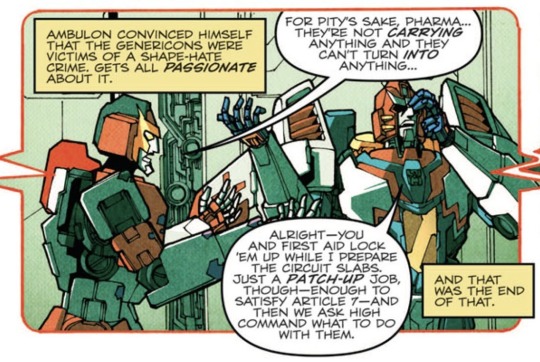
Also, First Aid later confirms that communications were fine until the Big Bang (soundbomb detonation):
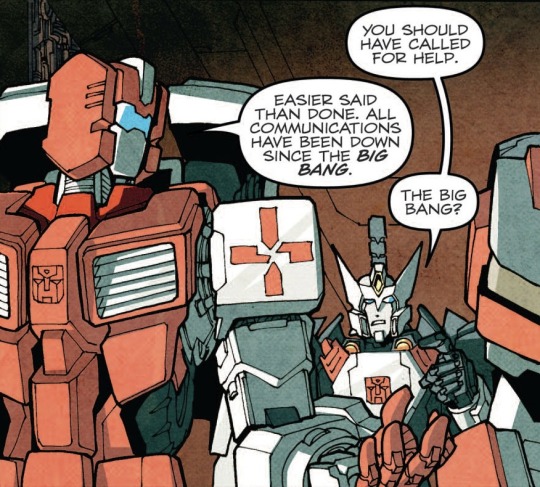
It’s always possible the DJD was monitoring the radio waves, but secure subspace frequencies exist, such as the Datalog Network First Aid used to send the datalog containing the death statistics:

Speaking of which, assuming First Aid sent the datalog with the statistics right when things started to get ‘weird,’ and before the Big Bang shut down comms, it only took—at most—a few days for them to reach Ratchet and Swerve on the Lost Light:

But back to Pharma not calling for help: for all of Prowl’s intel, contingency planning, and fretting over the security of Autobot territories, I find it hard to believe he would have stuck an Autobot medical team on the fringes of DJD territory without giving them some means of securely contacting the outside in case of issues.
But even if Prowl didn’t give Pharma a secure way to contact him or anyone else, and even if Pharma was convinced the DJD was monitoring regular communications, there were other ways he could have reached out for help. After all, the team wasn’t alone on Messatine. Like Pharma said, Prowl continued to send bots to defend the nucleon mines:
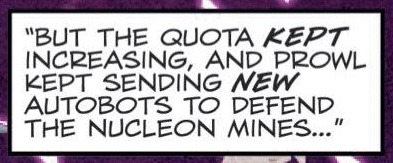
The Autobots had been mining nucleon for millions of years at this point, so I doubt the mined nucleon was just sitting in storage on Messatine; shipments of the stuff would have been sent off-world to wherever the Autobots needed it. Why not send a message for Prowl with someone leaving with one of those shipments? A message meant only to be sent over a call when absolutely certain they were out of range of the DJD’s potential monitoring.
Or, why not order in off-world medical supplies and send a message back with the delivery bot(s)?
There are two possible answers to this. One takes into account JRO’s word on the subject; the other is more intricate and speculative on my part, but it leads to the same place. So whatever your stance is on the validity of word of god, there’s an answer for you.
Answer one (word of god)
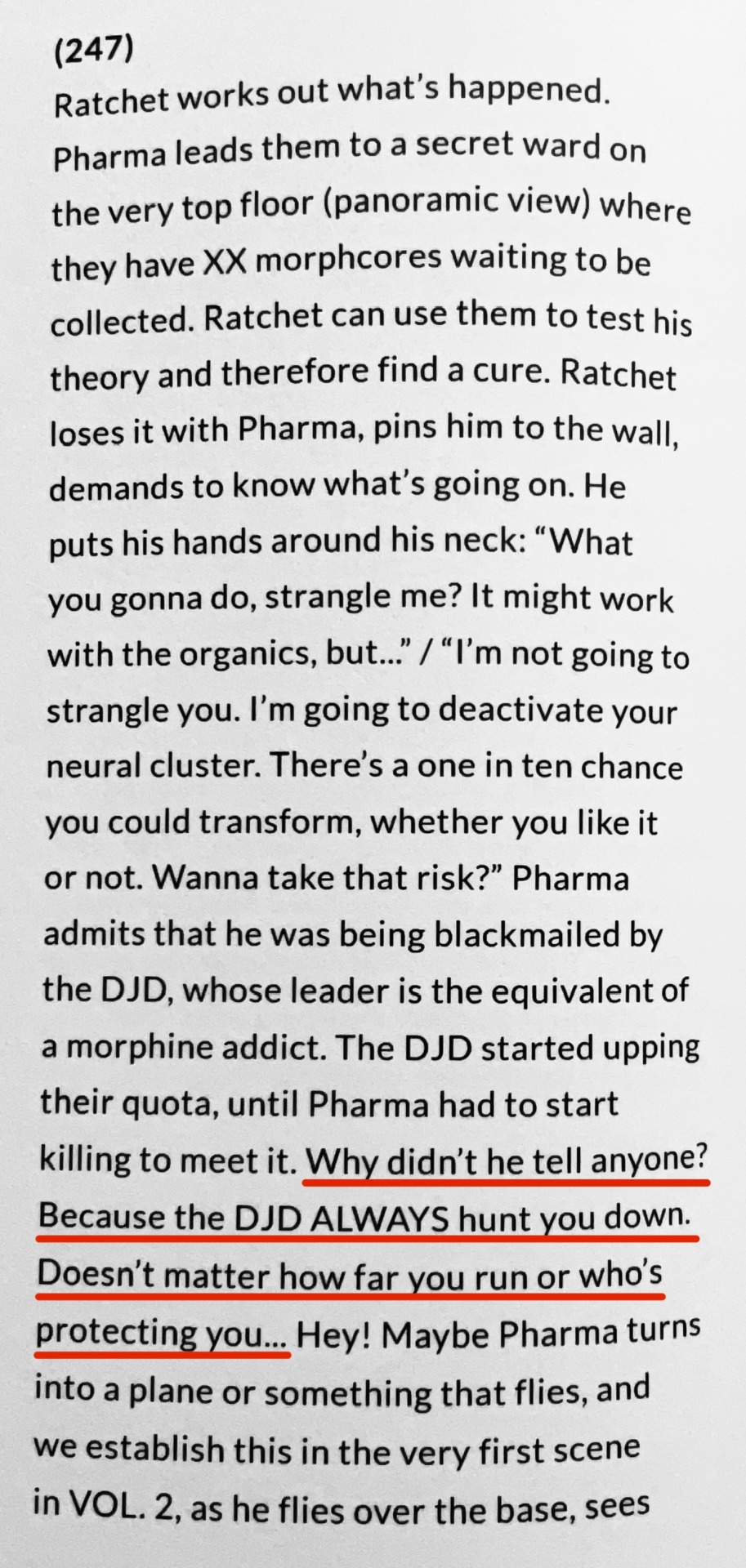
Simple as that. Pharma was aware of the scope of the DJD’s capabilities and relentlessness, and determined he was trapped prey.
Answer two (no word of god)
There are a few possible reasons Pharma didn’t call for help right away:
He was convinced all his other options would take too long and/or would still lead to him being put under suspicion. After all, being found to have harvested even a single T-cog from an already-dead patient for the DJD could have raised concerns that would lead to Pharma being investigated and/or having a mark put on his record.
He underestimated the severity of Tarn’s addiction, and was certain he could keep up with the T-cog demand without resorting to other means of harvesting, not realizing Tarn’s quota would increase later on.
He was already paranoid as a result of whatever mind games Tarn had set in motion at their first meeting, making Pharma think escape was futile.
Word of god or no word of god, there are clear reasons as to why Pharma ended up trapped. Most likely, it was a mix of all of the above.
Whatever was going on in Pharma’s mind before, he ended up in deeper trouble. Tarn increased his demand for T-cogs, and Pharma couldn’t keep up. By the time this happened, even if he had wanted to call for help, it was too late to do so without implicating himself. He reasoned his only option was to start killing patients to harvest their T-cogs.
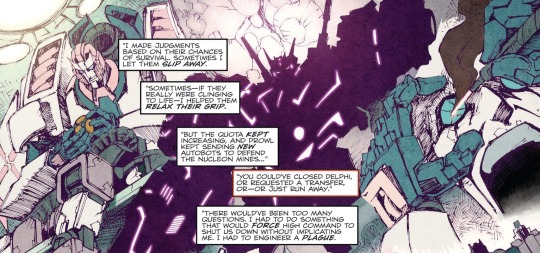
Soon, Pharma was so consumed with fretting over whether he’d be able to meet Tarn’s next demand that he didn’t have time or freedom to do anything else except worry and feel guilty. His whole life revolved around Tarn’s addiction; he was no longer in control, and could no longer enjoy whatever it was about Delphi he’d previously enjoyed. Perhaps the facility itself enabled Pharma to research cures and perform scientific miracles of medicine.
Being at the mercy of Tarn—convinced the DJD would find him no matter what—would have been pure psychological torture on its own, but also knowing that any small chance he did have of getting help would end in him losing everything would have added to his suffering. Pharma became desperate to reclaim control over his life and began planning an escape.
Now, JRO has said that Pharma didn’t originally plan to use the rust plague on the DJD…but canon says otherwise:

Of course, Pharma could have been lying to make himself look better in Ratchet’s view, but based on everything he’d been through up to this point with Tarn, it’s more likely he was telling the truth and had tried to eliminate the source of his suffering first. After all, wiping out the DJD would have been the simpler, cleaner option.
When the Duobots refused to detonate the soundbomb near the DJD, Pharma’s objectives shifted. He had to get Delphi shut down in a way that would:
Convince the DJD the shutdown was legitimate.
Pharma knew chances of escaping the DJD at all were slim to none, but he was desperate. Getting Delphi shut down would cut off Tarn’s supply of T-cogs and allow Pharma to escape Tarn’s immediate control, but the shutdown had to be “legitimate” to prevent Tarn from retaliating and hunting him down later. Leaving Tarn even the slightest chance of regaining control was too risky, so Pharma had to make sure his plan was as airtight as possible.
Cover up the patient murders.
If the truth got out about Pharma killing patients, he’d lose his medical license and most likely be put away for life. Being cut off from the practice of medicine and his intellectually stimulating work as a doctor would mean losing more than a job and a reputation. It would mean losing everything in which he’d anchored his sense of identity and life’s meaning. His refusal to consider any other options wasn’t just about ego and preserving his image as an excellent doctor; it was about preserving any kind of meaningful future he saw for himself.
Pharma needed a plan that would fulfill all of the above. Turning the engineered virus on the medical facility was the most effective and efficient solution. Anything else would have made him suspicious in the view of either Autobot High Command or the DJD, and neither of those would have ended well for him.
Because of his goal to preserve his reputation and future in medicine, he couldn’t even risk revealing anything to First Aid or Ambulon, who would have seen to his ruin. They became nothing more than loose ends that had to be tied up, and based on the fact that Pharma only prepared one vial of the vaccine, his original plan involved him being the only survivor:
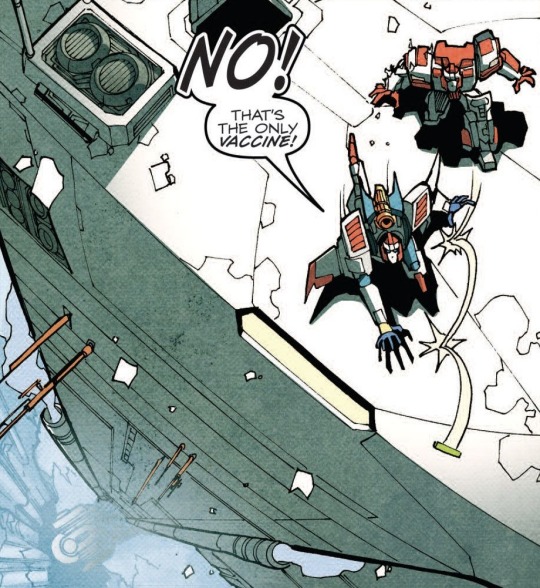
He probably would have had no problem making more of the vaccine for anyone else who survived, but he wasn’t counting on it. He wanted a totally clean slate; in letting his staff die with most of his patients, he would be getting rid of any and all evidence and reminders of his failures. He may have cared about First Aid and Ambulon before things got bad, but somewhere along the way, he decided either it wasn’t worth it to go through the trouble of finding a way to save them without raising suspicion, or he didn’t want to risk them putting together the pieces later on.
Of course, when Ratchet showed up, plans changed.
Ratchet
Ratchet is not the kind of person who seeks first to understand or be understanding. He’s inclined to trust what’s in front of him over anything abstract, and tends to look at the results of someone’s actions over trying to find any kind of ‘why’ behind them. Also, unlike Pharma, he operates from a strong moral sense, and reacts quickly and strongly when something or someone goes against that internal moral sense.
Ratchet’s reaction to finding out what Pharma did may seem hasty and harsh, but it makes perfect sense on a human level. There is no such thing as unconditional love; everyone has personal and moral lines (boundaries), and they’re different for each individual. When the most rigid of lines is crossed, that’s it; walls go up and the offender is cut off, no matter how strong the relationship may have been.
Ratchet obviously knew Pharma well enough to think he could try talking some sense into him, but then Pharma revealed that he’d crossed one of Ratchet’s lines: murdering patients. Any willingness Ratchet may have had to try to understand vanished. By the time Pharma started trying to provide a ‘why’ for his actions, Ratchet’s moral judgment had already shut down any chance of understanding what could have possibly led Pharma to kill patients. It didn’t help that Pharma seemed totally unapologetic and outright proud of his plan. For Ratchet, the ‘why’ didn’t matter anymore. What he saw was what he trusted, and what he saw was a friend who’d become his idea of a monster.
Now, Ratchet and Pharma’s relationship is one of the most confusing IDW relationships I’ve had the pleasure and pain of dissecting.
It is notoriously difficult to determine the depth and strength of a relationship from the outside. However, I’ve decided to go ahead and address it anyway because it has the potential to provide insight into Pharma as an individual.
If I were to sum up Pharma and Ratchet’s relationship in a single word, I would use “ambivalent.” The first time I read MTMTE, the thing that stood out to me most about their relationship was the drastic differences between how they each perceived the relationship.
In one sense, there’s the idea of Pharma basically being Ratchet’s crazy stalker ex, which is tossed around in fandom a lot. While I personally dislike seeing it regardless of context (yes, even as a joke), I do see how JRO’s writing choices set things up in a way that makes it easy to superimpose that trope.
In another sense, there’s the idea that Pharma and Ratchet were always close friends, and that what happened at the end of the Delphi story was a betrayal of both sides that came out of nowhere and whose consequences were taken too far.
I disagree with both. Personally, what I see at the end of the Delphi story isn’t an obsessed ex gone mad, a sudden betrayal, or a badly executed backstabbing. What I see is a breakdown of an already-complicated and poorly-maintained relationship: true feelings being revealed, long-repressed bitterness being forced to the surface, carefully-hidden cracks being split wide open.
Most people don’t have an accurate understanding of how much or how little they truly know the people in their lives, often overestimating how well they know a person until something surfaces and blindsides them.
According to JRO, Ratchet was oblivious to Pharma’s romantic interest, and throughout canon, it’s easy to see Pharma was more invested in the relationship than Ratchet ever was.
The question is, did Ratchet ever care about Pharma at all? And if so, to what degree?
Yes, Ratchet calls Pharma “buddy” and “friend,” but the former was sarcastic, and the latter means something different to each person. Also, in light of the circumstances, Ratchet could have just been saying “friend” in response to Pharma saying it—an emotional appeal more than anything.
However, Pharma must have been aware of Ratchet’s lack of relational investment because during the confrontation at Delphi, Pharma’s first reaction wasn’t to appeal to their friendship (ex: “But you know me!”). Instead, he appealed to their shared profession:
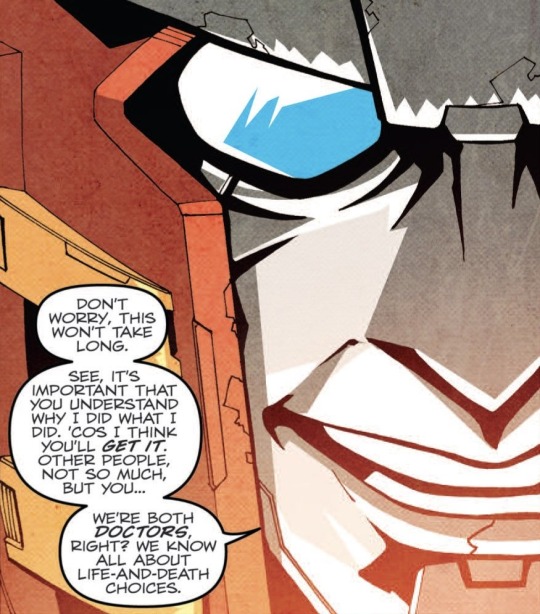
Then there’s the exchange of insults:
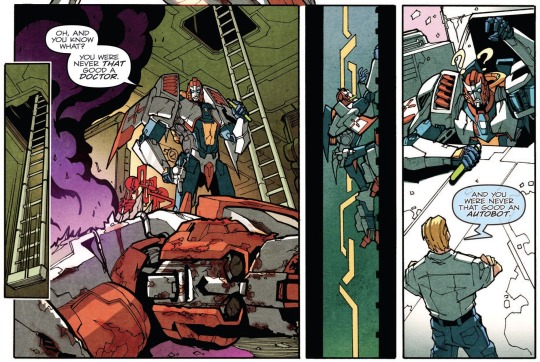
This is what I meant earlier by “true feelings being revealed.” Ratchet may have just been trying to match Pharma’s insult, but it’s unlikely it was merely reciprocal because while Ratchet is snarky at times, he’s sincere in that snark. There’s almost always some truth in his verbal jabs no matter how unserious they seem, and he’s never cruel for cruelty’s sake.
So, if Pharma saw Ratchet as an inferior doctor, and Ratchet saw Pharma as an inferior Autobot…it’s reasonable to assume there was always some deep-rooted competition and conflict preventing them from being super close.
Possible suspicion surrounding Pharma’s conduct as an Autobot paired with a tendency to misjudge the nuances of relationships could explain why Ratchet was so quick to decide Pharma was a lost cause. Maybe Pharma’s actions at Delphi confirmed something from the past that Ratchet had brushed off for whatever reason.
In any case, Ratchet seems to have been largely unaffected by the Pharma he found at Delphi. While leaving Messatine, he emphasizes that he’ll miss Pharma’s talent.

Not “who he used to be.”
Not “what we used to have.”
Just…“his talent.”
Later, on Luna 1, Pharma mentions that he and Ratchet were inseparable, but that could mean a few different things:
Best case scenario: Pharma and Ratchet sought each other out on equal terms.
Worst case scenario: Pharma followed Ratchet around.
Somewhere in the middle: the job forced Pharma and Ratchet to work in close proximity most of the time, and while Pharma intentionally ran into Ratchet more often than necessary, Ratchet also sought out Pharma every now and then.
Whatever the case, working with someone every day doesn’t tell you anything about who they are as a person, and the amount of time spent with someone doesn’t automatically correlate to how deep the relationship is or how well the people know each other. It’s not like either Pharma or Ratchet are shown to be good at expressing their personal feelings outside of extreme circumstances.
Ratchet does bring up late-night conversations of the past:

But while this indicates there was something deeper between him and Pharma, because neither of them were ever shown to be super open with their true feelings, it’s unlikely the conversations were full of touchy-feely talk. In all likelihood, the conversations were mostly medicine and war-related, with the rare spark-to-spark talk sprinkled in. Also, considering everything up to this point, one has to wonder if those talks ever meant anything to Ratchet, or if he was just digging for something that might stall Pharma’s torture.
Maybe those late-night conversations did mean something to Ratchet, but whatever the case, Pharma didn’t take the bait. He knew Ratchet was trying to stall by making an emotional appeal, and perhaps he was convinced the conversations hadn’t meant that much to Ratchet.
Looking at all of this, it’s hard to believe Ratchet ever cared about Pharma as more than an interesting work friend. But even if he had cared more than he let on, it wasn’t enough to overcome the doubts he had about Pharma’s character.
As for whether Pharma truly cared about Ratchet, I’m convinced he did, but in a mostly unhealthy way, and with a strong undercurrent of one-sided rivalry. At some point, Ratchet had been an equal and a source of challenge, and he probably listened to Pharma pretty often. It’s reasonable to assume Ratchet was one of the only people—if not the only person—able to handle Pharma’s intense temperament and challenge him in a meaningful way, providing some semblance of friendship for Pharma.
However, one last thing that stands out is that, when telling Ratchet why he’s torturing him, Pharma didn’t say anything like, “Because you hurt me” or “Because you turned against me—your friend.” Instead, he said it was for “ruining things at Delphi” and because “you declared war on my body.”
Either Pharma wasn’t being entirely honest, or Ratchet’s friendship didn’t mean as much in the first place as he’d previously implied. It’s possible the ‘Because you hurt me’ was implied in “for ruining things back at Delphi,” but why not say it outright? Perhaps it was a fear of vulnerability and admitting there was ever a relational need at all.
At the end of the day, it’s difficult to say for certain how close Pharma and Ratchet were, but it’s clear they were never on the same page and there were always barriers between them.
Luna 1
Revisiting the matter of Pharma’s morality taking a backseat to other priorities, his time on Luna 1 further underscores this. Again, Pharma chooses his battles and is unwilling to put himself at great risk for the sake of others, but a closer look at the situation with Tyrest reveals there wasn’t really anything he could have done for the Cold Construct population even if he had wanted to. It would have been him against Tyrest, an army of Legislators, and a bunch of Decepticons. Pharma knew his limits, and seeing as his goal was self-preservation, it was perfectly rational for him to go along with Tyrest’s grand scheme.
Besides, it doesn’t look like he was given much of a choice:

Although, knowing Pharma, he still would have demanded to know beforehand what he would get in return for the pain, and evidently, Tyrest held up his end of the deal since Pharma had access to the Luna 1 tech collection.
As for Tyrest’s plan to wipe out the Cold Construct population, there’s nothing indicating Pharma’s decision to turn a blind eye to it was rooted in malevolence or bigotry—just rational apathy: ‘I can’t stop Tyrest, so why concern myself with the outcome?’
Again, you can’t save everyone; Pharma had all he could do to save himself.
But it wasn’t all horrible. I would even go so far as to say Pharma found some happiness on Luna 1. Tyrest didn’t care about him, but he didn’t need Tyrest to care. Everyone else there hated him, but he didn’t need to feel like he belonged or was admired. At this point, Pharma’s only interest was Tyrest’s Luna 1 tech collection, and that meant playing nice so he could keep his reward. Back at Delphi, he probably assumed he’d never again practice medicine the way he’d loved; being brought to Luna 1 was an unexpected, yet welcome, second chance.
Even so, Pharma had his moments of cruelty. Back at Delphi, he had easily-identifiable reasons to kill patients—both the ones whose T-cogs he harvested and the 20 more he tried to kill when he shot the life support machine. But on Luna 1, he had no reason to be cruel, yet he chose to be. By this point, he’d mastered the ability to almost completely ignore or subdue his conscience.
In the case of Ratchet’s torment, one could argue Pharma only drew it out for retaliation purposes; it was personal for him.

As for cutting Ambulon in half, it was obviously meant to be as gruesome as possible, yet also quick. But personally, I don’t think it was about Ambulon; it was more about hurting Ratchet. Due to the fact that Ratchet’s identity is wrapped up in his compassion and his ability to be helpful as a doctor, one of the most effective acts of revenge would be to do something that makes him feel utterly helpless.
Also I wonder if, subconsciously or consciously, Pharma was attempting to recreate the sense of helplessness he felt back at Delphi under Tarn’s watch: “Do you see, Ratchet? Do you now understand how it feels to have control ripped out of your hands? To be totally helpless?”
Next, for some reason, Pharma was invested in the promised execution of Getaway and Skids:

He had no personal connection to either of them that would give him a reason to be interested, so maybe Tyrest told him he could perform the execution and/or have the corpses for medical experimentation. Either way, Pharma would have had a chance to use some of the tech in Tyrest’s tech collection, possibly explaining his excitement.
Of course, any chance of an execution disappeared when the final showdown went wrong.
When Pharma tried to escape to Cyberutopia and discovered he couldn’t pass through the spacebridge forcefield, he gave up. He’d been caught; he would no longer have access to Tyrest’s tech collection; Ratchet and every other self-righteous Autobot would never forgive him; and the morality lock prevented him from escaping. By all appearances, he would never again be able to engage in that which gave him a sense of meaning. He had shrunken his world down to his obsessive interest in a specialized field and one significant, yet unrequited relationship. With both of these lost, his world collapsed.
Yes, guilt played a part in Pharma’s despondency, but because he seems to have been in denial of said guilt, it’s more likely his despair was primarily due to the fact that he saw no future for himself. He had nothing left to live for.
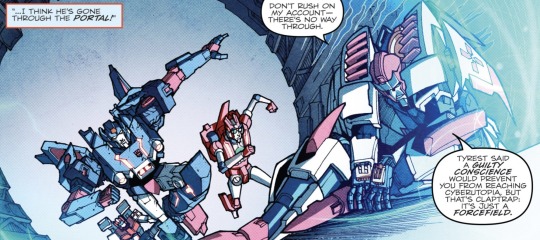
In light of this, Pharma’s flippant comments to First Aid make sense. He wasn’t being insensitive as much as he was goading First Aid. Pharma’s not stupid. First Aid had a massive rotary cannon on him, and Pharma knew exactly which emotional buttons to push to get him to pull the trigger.
Pharma wanted to die.
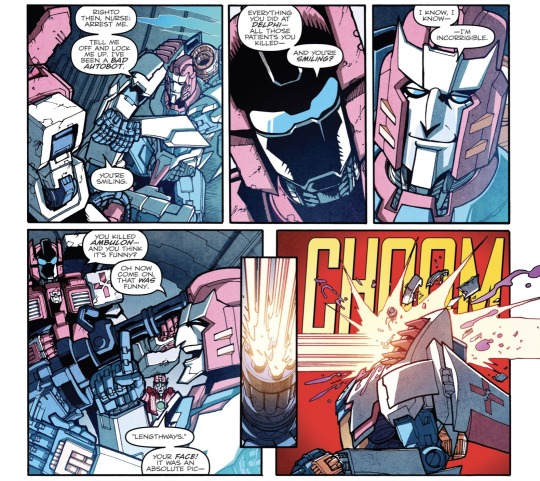
Adaptus
First, let me emphasize that Adaptus did not take possession of Pharma’s body. Instead, Pharma was the unwelcome guest:
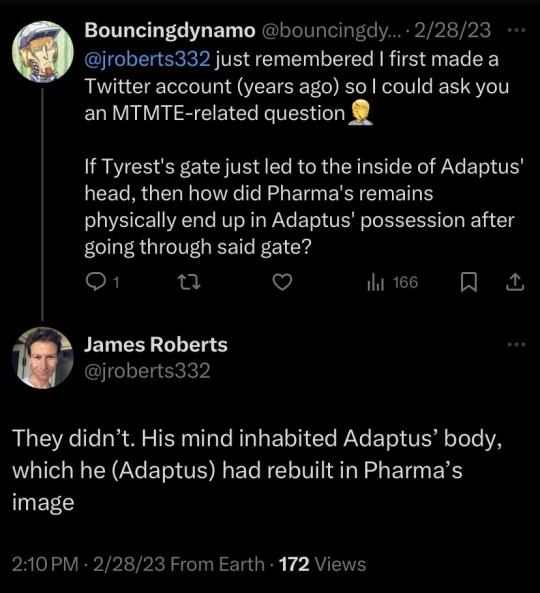
How Pharma ended up in Adaptus’ new body is a mystery, but whatever the case, Pharma didn’t pass on to the Allspark. Whether or not he had a choice can only be speculated.
First Aid had blasted Pharma’s head clean off, so whatever happened must have been related to the spark. Perhaps some residual spark energy was trapped in a body part that Adaptus repurposed, leaving Pharma tethered to the new body unwillingly.
Still, Pharma managed to assert his will and override Adaptus for a brief moment. Considering Adaptus was basically a god, this is impressive.
Based on Adaptus’ surprise at being interrupted, it seems he didn’t know Pharma was there. Why Pharma hadn’t tried to assert himself sooner is a mystery. Maybe Adaptus’ scheme was entertaining; maybe Pharma actually liked the company; or maybe he’d been waiting for an opportunity to get revenge on Tyrest for everything done to him back at Luna 1.
Sure enough, just like with Ratchet back on Luna 1, Pharma’s vengeful streak came out as soon as there was an opportunity.
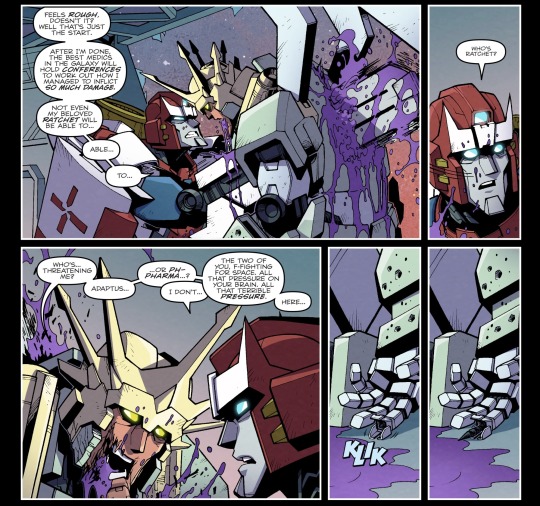
Unfortunately for him, this left him vulnerable, and Tyrest took advantage of the confusion:
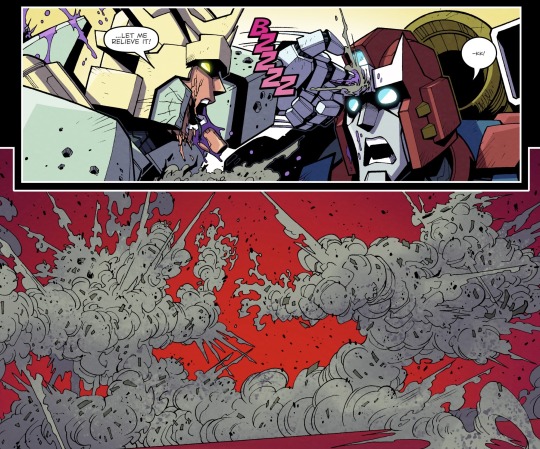
Conclusion
When someone reduces their world to narrow personal interests and one or a few very special people, their grip tightens around what little they have. They often become obsessive and possessive of the few things that make them feel alive, and their view of the world becomes increasingly more subjective and detached from the outside world. Pharma seems to have fallen into this trap.
Even so, in the context of the circumstances, several of the decisions he made were rational—even if coldly so. Oftentimes, “extreme” rationality and self-preservation are villainized in fiction, and characters like Pharma who don’t automatically put themselves at great risk for anyone and everyone are villainized, or at least looked down on. Their choices are often regarded as less human, but rationality and self-preservation are just as human as compassion and self-sacrifice.
Ultimately, Pharma was trapped and pushed over the edge into “insanity” by Tarn’s cruelty, but his own choices made from a place of pride determined how he fell, and how far he fell. It was a perfect storm of Tarn’s mind games and Pharma’s intellectual arrogance, excessive self-confidence, obsessive nature, and stubborn grip on the kind of future he wanted for himself.
Pharma is yet another Icarus who flew too close to the sun and paid dearly for it, and while JRO/the narrative could have given this Icarus better wings, that doesn’t change the fact that he chose to fly so high.
***
Many thanks to anyone who made it to the end of this monster of a post.
-tosses a Rodimus Star at you-
#look who finally finished this thing#idw transformers#idw1#maccadam#MTMTE#lost light#idw pharma#pharma#tf idw character analysis#tf idw meta#dr. fancy hands#nova’s nerding out again
579 notes
·
View notes
Text

Back in the 50s, Danny Thomas was a major TV star who had a successful comedy series on national television (CBS) called ‘Make Room for Daddy’ (Later changed to ‘The Danny Thomas Show’). The son of Maronite immigrants from Lebanon, read that a young medical student, the son of Chassidic immigrants from Ukraine, was struggling to pay his tuition, and donated the shortfall. As a result, countless lives were saved and made better by Rabbi Dr. Abraham J. Twerski, who passed away exactly one year ago.
Rabbi Twerski described the story in an interview with the Pittsburgh Quarterly on November 19, 2007:
“By that time, I had several children, so my dad and some members of the congregation helped me to pay for school. I applied for a scholarship through a foundation, but it didn’t come through, so in my third year, I fell two trimesters behind on tuition.
One day, I called my wife at lunch as always, and she asked, “What would you do if you had $4,000?” I said, “I’m too busy to talk about fantasies.” She said, “But you really do have $4,000!” I said, “From where?” She said, “From Danny Thomas.” “Who’s Danny Thomas?” She said, “The TV star.”
Then she read me an article from The Chicago Sun. Local officials had told Mr. Thomas about a young rabbi who was struggling to get through medical school. Thomas asked, “How much does your rabbi need?” They said, “Four thousand dollars.” He said, “Tell your rabbi he’s got it.”
Rabbi Twerski was a scholar with feet planted firmly in two worlds — the rabbinic world of Torah and Talmud study, and a medical doctor and licensed psychiatrist. It was a rare pairing that earned him respect in both the insular ultra-Orthodox Jewish world and wider American society. He was an expert on addiction and scion of a long line of prominent rabbis descended from the 18th-century founder of Hassidic Judaism, the Baal Shem Tov.
Rabbi Twerski was a prolific writer. He authored dozens of books on a wide array of subjects: from addiction and mental health to religious law for medical professionals and commentaries on Jewish texts. Twerski also collaborated with late “Peanuts” comic strip creator Charles Schulz on a series of popular self-help books featuring Charlie Brown and Snoopy.
May their memories be for a blessing.
Rabbi Yisroel Bernath
29 notes
·
View notes
Note
What type of TV shows are popular on Gallifrey right now?
📺 What's popular on Gallifreyan TV right now?
We may not have exact viewer ratings (because, unsurprisingly, Gallifrey does not concern itself with audience engagement metrics that often), we do know what types of shows are likely being watched.
If you missed the previous rundown of Time Lord TV, you can catch up here:
But if you're wondering what's popular right now, here are a few speculative guesses:
📡 Live Broadcasts & Government Programming
🛑 The Presidential Address – Daily updates on Capitol politics. - Thrilling (mandatory) viewing where the Lord President reassures the public that everything is fine.
🌌 The Celestial Observatory Report – Real-time updates on stellar weather and cosmic anomalies. - Essential for predicting temporal storms and vortex disruptions for your commute.
🌀 Temporal Affairs Committee: Open Session – An exclusive look at Gallifreyan policy discussions that should have ended 500 years ago but didn't. - Popular among elderly Gallifreyans and those with nothing better to do.
🎙️ The Lord President Speaks… Again – The exact same speech you heard this morning, but now with a special commentary track explaining why it's even more brilliant than you originally thought.
🎭 Popular Dramatic Programming
📜 The House That Stands – A prestige drama chronicling the rise and fall of an ancient Gallifreyan House. - Expect scheming, betrayal, and a shocking number of regenerations. - Allegedly based on true events, though every major House denies involvement.
⌛ The Untold History of Time – A long-running docudrama that contradicts itself every season. - Covers historical events such as the Pythia's Curse, the Rassilon Era, and the Eternal Schism Debates (a six-part special). - No two experts agree on anything.
🚀 The Renegade Files – A sensationalist anthology profiling Gallifrey's most infamous outcasts. - Features the Master, the Monk, the Rani, and the Doctor—with wildly exaggerated re-enactments and lousy acting.
🌀 Schism: A Time Lord Story – A coming-of-age drama following young Gallifreyans as they prepare to look into the Untempered Schism. Episode guide: - Ep 1: I Don't Want to Be a Prydonian! - Ep 2: This Is Fine. (It Is Not Fine.) - Ep 3: Is It Supposed to Whisper Back?
🎩 The Patrexian Conundrum – A detective series starring a Time Lord investigator who solves paradox-related crimes. - Every episode features puzzling inconsistencies in the timeline that must be unravelled. - Special twist: Every episode starts with the detective already knowing the solution—but needing to work backward to prove it.
🧠 Game Shows & Mental Challenges
🧩 The Prydonian Trials – A high-stakes academic showdown where Junior Time Lords must solve paradoxes, predict quantum fluctuations, and recite ancient High Gallifreyan poetry.
🔍 Who's That Renegade? – Contestants must guess which Time Lord went rogue based on obscure historical clues.
👽 The Mind Probe! – A high-stakes game show where contestants must answer Gallifreyan history questions under extreme pressure. - Face the infamous question: "You will answer… the Mind Probe!" (There is no actual mind probe.)
🎤 Entertainment & Cultural Shows
🎭 The 4D Theatre Showcase – Broadcasts of avant-garde Gallifreyan theatre. - Features time-loop performances and non-linear tragedies.
😂 Temporal Standstill – Gallifreyan improv comedy, featuring jokes that unfold over multiple centuries. - Watch performers set up a joke in one incarnation and deliver the punchline three regenerations later.
👶 Kids' Programming
📚 Junior Academy Lectures – Children's programming on Gallifrey is just accelerated coursework. - Topics include "Basic Quantum Entanglement for Ages 6-8" and "Your First 500 Years of Political Philosophy."
🏫 So …
Of course, what's actually popular depends on who you ask. And if you can't find something to watch there are still 87,656,432 channels. You'll stumble onto something eventually.
Related:
💬|⏰🎶What is Gallifreyan music like?: Musical instruments and genres on Gallifrey.
💬|⏰🎾What sports and games are there on Gallifrey?: The (lack of) physical sports on Gallifrey and other games.
💬|⏰🎮Do Gallifreyans have video games?: Detailing the one solitary 'video game' on Gallifrey.
Hope that helped! 😃
Any orange text is educated guesswork or theoretical. More content ... →📫Got a question? | 📚Complete list of Q+A and factoids →📢Announcements |🩻Biology |🗨️Language |🕰️Throwbacks |🤓Facts → Features:⭐Guest Posts | 🍜Chomp Chomp with Myishu →🫀Gallifreyan Anatomy and Physiology Guide (pending) →⚕️Gallifreyan Emergency Medicine Guides →📝Source list (WIP) →📜Masterpost If you're finding your happy place in this part of the internet, feel free to buy a coffee to help keep our exhausted human conscious. She works full-time in medicine and is so very tired 😴
#gallifrey institute for learning#dr who#dw eu#ask answered#whoniverse#doctor who#gallifreyans#time lords#GIL: Asks#gallifreyan culture#gallifreyan lore#gallifreyan society#GIL: Gallifrey/Culture and Society#GIL: Species/Gallifreyans#GIL: Gallifrey/Technology#GIL
32 notes
·
View notes
Text
Matthew Isbell at MCI Maps:
This is a unique newsletter issue today. Rather than coverage of an election, its more of a long-delayed commentary on the state of the modern right-wing. The horrible events in Springfield, Ohio have made it so that I just had to put these thoughts down in writing. Specifically, this is coming from my personal perspective as a devout Christian. As I see it, if there was any doubt before, the Trump/Vance weaponizing of Springfield shows just how un-Christian the GOP ticket is. My disdain for Donald Trump and the MAGA movement is no secret. I let it be known in my articles, and if you think that stuff is over the top, you should see my twitter account. I am fairly unique in the left, though hardly alone, in that my dislike for Donald and his followers is driven heavily by religion. While I can sit down and make all the arguments for why I believe left-wing economics is more in line with Christian calls to charity, and why extreme anti-LGBT attacks (calling people groomers and such) are a direct rejection of Christ’s words and actions toward love, this is not the topic of this piece. Unlike the countless far-right twitter users that put a cross in their name and call themselves “Orthodox” or “Trad Cath” and then quote one bible line out of context to justify their shitty behavior, I do not presume to be an expert on parsing all of scripture.
BUT, when looking at the racism and bigotry that permeates the MAGA movement and Trump world, there is plenty that even a novice on Christian doctrine can look at and say “oh this is not acceptable at all.” The attacks on Haitian migrants in Springfield Ohio is a perfect low bar for anyone to condemn. The verbal assault on an entire community, based off debunked neo-Nazi propaganda and repeated by Donald Trump, has, to me, perfectly separated the real from fake Christians. It has separated people who claim the cross from those who actually critically and spiritually engage with the Bible and its message. While I have ranted on twitter PLENTTYYYY about how immoral and Godless I find Donald Trump and his rabid followers, this latest bit of horror has made it so that I need to put this all down in writing - less I explode from bent up rage.
American views of Haiti
Having grown up in southern Broward County, I was exposed to Haitian culture through an increasing migrant population from the island. In fact, back in 2021, I wrote about the arrival of Cuban and Caribbean refugees over South Florida’s last several decades. Give that link a click for more data/maps on the story of South Florida. That article delves into how the US treated Cuban exiles, fleeing communist, differently from Haitian refugees, fleeing dictatorships and instability. Both Cuban and Haitian populations in Miami-Dade suffered backlashes at different times, which I covered there. Haiti is often viewed with a exaggerated caricature; with Voodoo being seen as a common practice in the Island. This was aided by folks like Dictator François Duvalier, also known as Papa Doc, who promoted himself as a Voodoo leader. Growing up in South Florida, EVERYONE knew about Papa Doc, the Voodoo Tyrant. An excellent series by the “Real Dictators” podcast on Papa Doc can be seen here. However, like much of local traditions, the role of Voodoo is often greatly overstated; sometimes by outsiders but also at times Haitian migrants who will lean into the “witch doctor” role to the American and Europeans who love to be wowed by the “primitive superstitions” and drop some cash for a fortune telling. When most Americans think of Haitian culture, they likely have a view similar to the Dr. Facilier song from Princess and the Frog.
[...]
What is Really Happening in Springfield, Ohio
Lets lay out what is actually going on in Springfield, OH. There is no shortage of false stories and fake statistics being thrown out. First, 20,000 Haitian migrants did not show up in the city of Springfield over night. Haitian migrants, many who were already living in South Florida and have visas or protection status, began to move to the city as it worked to attract new residents. Like much of the Midwest, Springfield was becoming a rust-belt town, seeing its population go from 80,000 to 60,000 over the last few decades. It was the site of abandoned buildings, crumbling infrastructure, and declining quality of life. Population drops are never good for the long-term health of a community, this is a constant across history throughout the world. The city successfully attracted new businesses to the community, but was facing a workforce shortage. Simply put, there were not enough workers who needed jobs in the area due to a population drop that had already taken place. Migrants, who by their status have less tying them down to where they are, began to move to the area and filled these jobs.
With the growth, which especially increased after the worst of COVID, there were challenges. Estimated Haitian migrants to the town are between 12,000 and 20,000; and of course the 20,000 is being quoted. The increase, which is high in such a short time, has led to issues with infrastructure and services. However, these issues have not been fatal, and also have been countered by renewed economic growth. In 2022, the local press were referring the growth as a “resurgence” for the area. City leaders are happy with the population increases and the economic renewal that they have inspired. Keep in mind that as people move to an area and work, they build up wealth and re-invest that in the local economy.
The far-right has acted as if immigration dropped off 20,000 migrants with no jobs and destroyed the town. That is a bold faced lie. Claims of increased crime have also been rejected by the law enforcement of the city itself. The data from the city’s court system show no major jump in crime and no evidence of disproportionate crime done by the Haitian residents. Like is commonly the case, immigrants tend to be more well-behaved than native citizens. The rapid growth does lead to challenges, and the city has been working with the state on getting extra funds to provide what they need to. A need for more housing, better roads, and more service centers, is a real issue. However, it is a fixable issue and still beneficial long-term.
[...] A majority of the Haitian migrants are Catholic; which has long roots in Haiti. As such, many churches, whether Catholic or Protestant, have commented on the increased Haitian population leading to increases in church attendance for the first time in decades. Far-right commentators latch onto the history of Voodoo being incorporated into Catholic teachings. However, this of course becomes a racist caricature which overlooks how much modern Haitian Catholicism still mirrors the broad church. Books have also been written extensively on the merging of old “pagan” beliefs with Christianity; whether in South America, North America, or Europe. Always remember the Christmas holiday stems from pagan winter festivals.
Matthew Isbell has a must-read MCI Maps piece on the MAGA lies about Haitian migrants in Springfield, OH are un-Christian.
#Matthew Isbell#J.D. Vance#Donald Trump#Haitians#Christianity#MAGA Cult#Springfield Cat Eating Hoax#François Duvalier#Springfield Ohio#Religion#MCI Maps
6 notes
·
View notes
Note
Thank you for pointing us towards the Moon Knight vs Shroud issue in your tags. Much appreciated! I'd be curious if you have any other information on the Shroud and any other times he and Moon Knight have crossed paths. Besides his appearance in the Avengers Unlimited arc, I am not terribly familiar with the character. Thank you again for all you do - I look forward to your commentary on the new release every month.
Hello!!! Thank you for submitting an ask as it’s always great to hear from you! :D Unfortunately, I wouldn’t consider myself a Shroud expert (although I would be fascinated to meet anyone who does???), with most of my experience with the Shroud coming from brief encounters with other characters while reading through their comics.
What I do know is Maximillian Coleridge has a rather Batman-like origin (common criminals gunned his rich parents down in front of him and he consequently dedicated his life to fighting crime), but instead of learning from the League of Assassins, Max threw in with the Cult of Kali. The graduation for that group however involves getting a forehead mark that grants extrasensory perception at the expense of one’s eyesight. The cult booted Max out after that and he seems to have spent most of his career since on the darker side of gray, with one of his first plans to make a name for himself as a hero, for example, being to just straight up assassinate Doctor Doom (oh and he also has his own means of shadow travel, make of that what you will). One reoccurring theme for him seems to be getting involved with criminal or villainous organizations to subtlety manipulate them into doing good. That brings us to how him and Marc meet, by the way! In Solo Avengers (Vol. 1/1987), #3, Max is leading a villain group called the Night Shift and sets up a test of combat to show that Marc should be the group’s leader (although he fails to tell Marc this until only after Marc has thoroughly trounced him and nearly smothered Max with his own shroud).
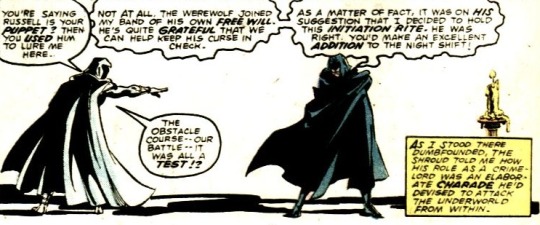
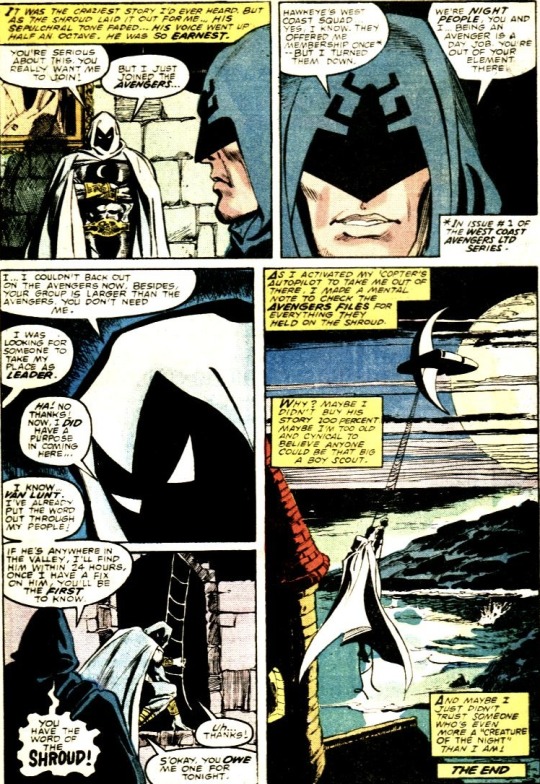
Looks like Marc called in what he owed as Max then helped Moon Knight wrangle Taurus for the West Coast Avengers in West Coast Avengers (Vol. 2/1985), #29.


Since then, they haven’t interacted much! They were in the same Heroes for Hire network in Heroes for Hire (Vol. 3/2010), but I haven’t found any instances of them interacting on-panel there. Also, as you mentioned, they had a brief team-up in the Avengers Unlimited infinity comic (issues #33-36 specifically for anyone curious), but while friendly, it was a pretty utilitarian team-up that focused mainly on Jessica Drew and Moon Knight and the Shroud only had the most surface-level interaction.
But I guess that first meeting really had an impact on Max (I mean, me too, but wow)! Again, I’m no character expert, but it seems that Max tends to cycle through periods of great violence and/or mental/emotional volatility (his wiki page straight up calls him a sociopath which….hmmmm….), so while I have very little faith that that was handled with any care in past comics, I look forward to seeing what Mr. MacKay might do with his character.
Fun fact: Max was however in the Bar With No Name when Mr. Knight strode right in and made one of my favorite proclamations of all time in Moon Knight (Vol. 9/2021), #7.
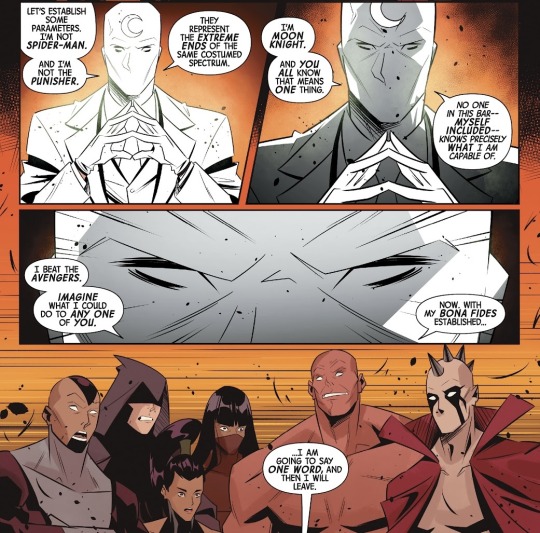
#Knight Mail#Thanks again for sending in an ask#always a pleasure to see you pop up in my notifications and it makes me unspeakably happy that you enjoy this blog!!!#quick aside: I so wish April Fool’s had come a day later because then I would have had the chance to do the funniest thing#i.e. pretend that I was abandoning Moon Knight comics to instead focus solely on The Shroud
16 notes
·
View notes
Note
I find it so amusing that all of a sudden an English literature undergraduate degree is to be a revered and esteemed point of view in the interpretation of the ACOTAR series. All the while there have episodically been those in the fandom with PhDs and MDs (psychologists discussing trauma, mental health professionals who have been consultants on screenwriting and writing projects, OBs explaining how having pliable bones doesn’t change the soft tissue of a woman’s reproductive system, etc etc) explaining a particular subject matter expertise being met with severe harassment, accusations of lies about their degrees, doxxing threats to expose them to licensure boards, and all out attacks and assault. You’re telling me that, now, an English lit degree is an authority on interpreting subjective fiction novels and that’s just supposed to be taken as a word of deference?
I mean absolutely no hate towards anybody with an arts degree when I say this (I, too, have one)- but literature is not a science. There is no exact, reliable way to interpret literature. Scholars still debate great literary works throughout history. Lit is not a science. Do some people have a higher level of education that enables them to detect certain literary devices? Sure. But I think the point being missed here is that literature is not a science. It cannot be reliably interpreted outside of any one person’s individual bias. Culture, socioeconomic status, race, life experience all factor into how one interprets art. That’s fine and good. You don’t need a degree in lit to understand ACOTAR and pick up on foreshadowing. Education does not mean you can interpret subjective material without bias. That is the point of the scientific method in interpreting objective data.
One would argue that advanced degrees in most fields, particularly science driven studies where research is conducted in some capacity, are extremely equipped to think critically and analytically about what they read.
Seeing this all explode has really made me flashback to how actual licensed professionals in this fandom have been treated for attaching their credentials to their commentary or blog on a subject matter they have actual expertise and advanced training/experience in. Seeing the same people who attacked others with so much vitriol have this defensive energy is truly full circle. I can’t help but think how some of those in this fandom might be sitting back watching the hypocrisy. Where was this energy when actual experts with doctoral degrees and licenses were being attacked? Just wow.
Like you said, Anon, what's amusing to me is that some of these 'degreed' people seem to be under the impression that there is one answer to a written piece of literature. That there is something 'definitive' about their own personal interpretation. Where in reality, indeed, things are being debated for hundreds, and sometimes thousands of years. Everything from the Bible, to Plato, to Shakespeare, to Jane Austen, to Kafka, to Tolstoy, to Tolkien.
There might be some consensus on interpretation of texts, but at the same time, that's all it will ever be--interpretation.
Anna Karenina throwing herself under a train: the number of interpretations of why she did it is as vast as the number of people reading the book. Did she do it out of guilt and shame? Sure. Did she do it out of a sense of despair over her future? Absolutely. Was she a product of her time, where women had no freedoms? Yes. Was she a rebel? Sure. Was she amoral? Certainly. Did she deserve her fate? Yes. Did she not deserve her fate? Also yes.
People just need to calm the hell down and stop acting crazy. Nobody cares if you have a degree. ALso, if you have a degree and you are WRONG In the end, that's just going to be embarrassing. So just be and let others be as well.
8 notes
·
View notes
Text
So I was on the plane back and I took a chance on Late Night With The Devil. Now I watched it blind so I didn't know about the controversy and I'll have thoughts about that at the end. But the movie left me with some thoughts.
One the intro sets up the fact that this is clearly a retrospective and we as the audience are expected to know what happened after. Think the OJ trial level of sensationalism, which makes me believe the theory that Jack probably had trial live on the air. In the universe this is a well known case. The Gus scene with the worms raises some interesting questions about what the in universe live TV audience saw. Like the movie starts with a documentary feel and ends with what's clearly Wriggles/Abracadabra messing with Jack. Like did the documentary have a second half with like the aftermath and commentary? I would imagine so given the intro, so did the demon hijack what we saw? Was it just poor writing? I would love a follow up series of in-universe videos in different styles. Like maybe some YouTube coverage, what news casters were saying, etc. I do think that the ending should have called back to the documentary set up because I don't hate the intro as world building, but it would have worked better for me if they had a "come back for part two," "Stay tuned for our experts" or smth. As it stands it's easy to call lazy exposition.
The movie is clearly tackling a lot of the insidious nature of the show biz world both the TV/Movie side and the more respected but ultimately similar book world. Everyone in the movie is being exploited, and aside from Lilly, they willingly exploit others. They're all cogs in a machine they have no control over, but clearly have no desire to stop the machine, or are easy to push back into place. I think there's a reason we don't meet any of the characters that quit and it's because they're not the point. It's way more compelling to get Phil who clearly is just doing his job, but is also unwilling to stop and consider if maybe he should be doing it at all. The makeup lady(Sammy maybe?) who sees how fucked everything is and just jokes about it. All of the characters know on some level it's wrong to allow what's happening but none are willing to stand up alone or even with their peers.
It doesn't matter how much of a fraud Christou is either. Was he a medium with actual skills who compromised on his morals to get ahead? Was he a fraud from the start who was used as a toy to get attention by Wriggles? Does it matter where on the scale he falls? It all comes to the same place. And that's the tragedy of it. The adults all made the choice to sell themselves, but Lilly was groomed for the cult and then for June's ambitions. I won't pretend to know exactly what would have been best for her given demons are real in that universe and so regular therapy could have been more disastrous, but like... June being her doctor, weird demon wrangler, and guardian was fucked up.
I don't think Jack knew what his deal was, at least not fully, and he's definitely being yanked around. The only Maddie who is for sure not a demon is the clips from before her death. After I'm not willing to say it's her. It's either Wriggles pushing her spirit around or straight up impersonating her. While the ending death montage felt rushed I don't think that's necessary a con. We feel unbalanced just like Jack does. The whole sequence of him going through his past moments was good.
Also the Grove and satanic panic were well incorporated. Like as someone with passing awareness of the references, it still all read really easily, and I'm sure for those more familiar with what was being referenced there's a lot there.
Overall I think it needed a bit more.. finishing if that makes sense? Like it feels like one or two steps away from complete. And now I'm going to get into the AI(which I hate calling it so I'm going to call it what it is which is image generation nothing intelligent about the digital equivalent of tracing and copying) images and my thoughts. I didn't notice but that doesn't really say much given the guy in front of me on the plane kept shoving his seat into my knee and the lady on my right kept bitching at the poor attendant. I don't think they have any excuse for the images being in the final cut for a few reasons, 1) image generation programs had been called out for being trained on stolen art before it released fully and they could have gotten it replaced, and they chose not to and 2) they didn't even have the excuse of not knowing better because while the images could have been pre debates they weren't locked into a contract.
To the point of "Well don't disrespect all the work put in by the actual artist they're only there for like a combined 30 seconds" 1) I don't fucking care, 2) the disrespect to the actors and other real artists is the decision makers on the film not pulling the images. They are the ones saying the work is comparable and belongs in the same film, and 3) I don't fucking care how indie they are, either pay for the work or don't use it. If you can't afford to pay an artist to draw for you, then you don't get the art. Using a cheap program(that's cheap because it steals) to replace real workers(some of whom are the same artist being stolen from) is scummy. If you can't afford to pay for labor then you can't afford to be in business.
#late night with the devil#if i get any people trying to debate me on image generators then im just going to block you#you're not going to convince me not to stand up for other artists#just block me and move knowing ill do the same to you
4 notes
·
View notes
Note
Ohhhh, you know what would be beautiful?
We'll have River meet Yaz - that needs to happen anyway in my book - maybe she'll show up at the support group or something. And then we need the Doctor Moon in her pocket on some device (sneakily listening in on the companions talking or maybe River muted herself for the therapy session) and we need a working hologram implant on Yaz.
And then they meet :)
(tbh I am very tempted to draw Dr. Moon on some screen perched on a desk side by side with hologram!13 watching with puzzled looks as Yaz and River flirt in the background)
I am very in love with the phone Dr. Moon idea. Even if it is revealed he isn't the Doctor (or it never is revealed whether he is). It can be a little bit like 12 in Clara's ear in Flatline, making commentaries and helping out technically. Or I assume like Mr Smith, but I don't actually know SJA, so Idk how fitting that comparison actually is.
If he still is in the library and live streaming and not just some downloaded copy, we could have Anita or Cal or someone take over from time to time to say hello to River and help out.
River has an archaeological problem: "Sweetie, get me Dave for a second, will you? This is his specialty subject, I need a second opinion and frankly, in this regard you are - practically useless."
"River! I am in the biggest library in the universe! I can just look it -"
"This is no book knowledge, dear, and we're kinda [in whatever mortal danger they are in]. Dave? Please? In your own time?"
And obligatory "River thinks Yaz is the Doctor" for a sec PLEASE! Yeah i think it'd be epic if they met and the hologram started glitching in and out of different versions of the Doctor bc of interference from both River and Doctor Moon.
Yeah, it's a whole pocket sized expert team!
ANITA i kind of forgot that was lowkey obsessed with Anita, do you wanna see a moodboard type thing i made for her?

Well i'm showing you anyways. If River has some contact with the Library inhabitants still, i DEFO wanna see some more character moments for Anita. She got her face back, is she still genius? If personality traits can be changed so easily when you are just code - how can you be sure that you are a real you? Basically i want some existential themes, questioning humanity and all that jazz, her arc would fit nicely with River's here, since River is also just code now. How easily River can be changed from outside, who got her out of the Library and for what purpose and what is the price? It can very quickly go extremely dark, but i hope we can keep the balance
5 notes
·
View notes
Text
✨March Manwhore Madnes✨ Official Commentary— Day 10
Good morning, Nikkiblr, and welcome to another exciting day at the Manwhore Quarter Finals! Yesterday’s matches wrapped up as anticipated, propelling Nidhogg and Loen into the Top Four of their leagues, while sending both scions of the Mercury family packing. While Nidhogg’s performance has been long anticipated before the tournament even began, Loen’s strength has been something of a surprise for our experts. But it just goes to show a true Manwhore has to have it all—looks and attitude.
Today’s match ups will be no less interesting! In the Shining League, former Manwhore champion Caprico returns to the polls, this time against the very person who took second place at Manwhore Monday, Qin Yi! Now, normally Qin Yi is a very strong candidate, but he’s lost to Caprico once before, and he surely would have wanted to avoid facing him until he could at least secure one of the Top Four Manwhore spots. Unfortunately for Qin Yi, the brackets did not do him any favors this year, and that’s been showing in the early morning voting, which once more appears to be heavily favoring Caprico. Will Qin Yi be able to make up lost ground throughout the day? We will have to see!
Meanwhile in the Love League, there’s a much closer battle being waged. That smirking politician Zhu Yuxian goes up against that smirking devil doctor, Gray Raven! Both of these manwhores have their own strong base of supporters, and today might just become a nail biter in the love league! Currently Zhu Yuxian leads, but Gray Raven is close enough behind him that the Zhu Clan Head should by no means get comfortable! Stay tuned for more updates as our Quarter Final polls progress!
17 notes
·
View notes
Text
[chp 5 pike/spock fic]
“You’re half human, but your physiology is mostly Vulcan. I guess I’m curious what it was like. How different it really was to be human for a few days, now that you’re back to yourself.”
“Confusing,” Spock replied honestly. “I have always been taught emotions run deeper in Vulcans than in humans. And that difference plays a large role in how we have always explained to our human allies our need for the strict controls offered by the path of pure logic, as well as why we do not expect humans to do the same. But that difference was so negligible as to be absent in my altered state. VSA medical experts opined that the late-onset regressive puberty that was triggered by the change was responsible for my heightened emotions during that time, rather than my humanity itself, but I am not convinced.”
“Wait, the VSA talked to you about this?”
“Yes, after reading Christine’s paper about changing me back using ancient medical arts, they had…questions.”
“That sounds invasive.”
“Their curiosity was logical. There are no records of any Vulcan experiencing the human condition.”
Chris hummed in understanding. For all that Spock’s tone was exceedingly dry, Chris knew well enough that extra attention from Vulcan doctors wasn’t exactly high on Spock’s list of desirable things. He was sure Nurse Chapel hadn’t predicted her paper would precipitate them going around her back and interrogating the subject patient, whose identity wasn’t rocket science to figure out given the small number of Vulcans serving in Starfleet. Chris wasn’t even sure whether Spock told her the Vulcans had followed up with him about it.
“So because your hormones were all out of whack, they discarded any challenge to the prevailing theory about the emotional gulf between our peoples.”
“Precisely.” Spock closed his eyes. “And of course my hormone spikes were not the only affliction impeding the baseline of my suppositions.”
Chris sighed. He knew what ‘affliction’ many Vulcans treated Spock as suffering from. “Your human half.”
“Indeed. In any event, it was convenient that my people were not given cause to reassess their superiority in light of my unique condition both before and during the anomalous event.”
“Convenient,” Chris repeated sadly. “And what do you think? Because I think you’re the product of a loving and intentional desire for a bridge between us. And I think you were uniquely situated to offer insightful physiologically-based philosophical commentary. To be blunt, they should care what you think about it. I know I do.”
Spock’s brown eyes held many emotions – an echo of Chris’s sadness, playful amusement at Chris’s steadfast declaration, and maybe a sliver of hope. “I think we have more commonalities than differences. However, the differences in our brain chemistries cannot be denied. Like Vulcans, humans have a war-torn past. But billions of humans, who wholly lack Vulcan physiological controls, are capable of living peacefully under the terms of the Federation. Some of the Vulcans that T’Pring works with have abdicated those controls. The results are never…peaceful. Vulcans who eschew Surak’s path are often irrepressibly violent.” Spock paused. “I have reached no particular conclusion. I do wonder if with more time to acclimate to my humanity, past the settling point, I might have reached a deeper understanding. Still, despite the limitations on my data acquisition, I do not regret Christine’s brave efforts to restore me to my usual if unique state of being.”
“I could give her another valor medal,” Chris offered.
Read the full chapter on AO3.
#what if I took SNW Charades and made it sadder#snw spock#snw charades#pikespock#pike x spock#fic update#fic rated E#Vulcans#this snippet rated g for everyone
5 notes
·
View notes
Text
Doctor Who: 73 Yards Review | Earth Station Who
New Post has been published on https://esonetwork.com/doctor-who-73-yards-review-earth-station-who/
Doctor Who: 73 Yards Review | Earth Station Who

Get ready for a deep dive into ’73 Yards,’ the latest thrilling episode from Season 14 of the new Doctor Who series, on the Earth Station Who Podcast! Join hosts Mike F., Michael G., Mary Ogle, and special guests Matthew Kresal and Jeremy Wilcox as they unpack every suspenseful moment. Discover the intrigue behind the Doctor’s mysterious disappearance and the enigmatic woman who remains precisely 73 yards away from Ruby Sunday. Explore the chilling mystery of Mad Jack and delve into the episode’s key themes, character developments, and the secrets that the woman is using to scare people away from Ruby. Whether you’re a die-hard Whovian or new to the TARDIS, this episode promises engaging insights and expert commentary on all things Doctor Who. Tune in now for the excitement and adventure of ’73 Yards,’ exclusively on the Earth Station Who Podcast!
We want to hear from you! Please write to us at [email protected]. Also, please subscribe and rate the show on iTunes, Amazon, YouTube, or wherever fine podcasts are found. Feedback is always welcome and much appreciated.
Links Listen to older episodes of the Earth Station Who Podcast ESW on iTunes Earth Station Who on Spotify Earth Station Who on Instagram Earth Station Who on YouTube Make-A-Wish Foundation The ESO Network TeePublic Store The ESO Network Patreon Bat Chums
Promotion Cosmic Piza
If you would like to leave feedback or comment feel free to email us at [email protected]
EarthStationWhoPodcast #73Yards #73YardsReview #DoctorWho73Yards #DoctorWhoSeason14 #NewDoctorWhoepisode #DoctorWhopodcastreview #DoctorWhomystery #RubySundayDoctorWho #RubySunday #MadJack #MadJackDoctorWho #DoctorWhocharacteranalysis #DoctorWhoepisodediscussion #DoctorWhofanpodcast #DoctorWhoReviews #DoctorWhotheories #DoctorWhocommentary #TARDISadventures #DoctorWho #DoctorWhoPodcast #Podcast #DoctorWhoepisodeanalysis #DoctorWhofaninsights #73Yardsepisodebreakdown
#73 Yards#73 Yards episode breakdown#73 Yards Review#Doctor Who#Doctor Who 73 Yards#Doctor Who character analysis#doctor who commentary#Doctor Who episode analysis#Doctor Who episode discussion#Doctor Who fan insights#doctor who fan podcast#Doctor Who mystery#Doctor Who Podcast#Doctor Who podcast review#Doctor Who Reviews#Doctor Who Season 14#Doctor Who theories#Earth Station Who#Earth Station Who Podcast#ESO#ESO Network#ESW#ESW Podcast#jeremy wilcox#Mad Jack#Mad Jack Doctor Who#Mary Ogle#Matthew Kresal#Michael Gordon#Mike Faber
3 notes
·
View notes
Text
LiterateMisfit's Doctor Who Journal
Series 1, Episode 2 "The End of the World"
The second episode opens with the Doctor and Rose in the TARDIS, allowing us to begin familiarizing ourselves with this iconic space that the first episode spent so much time hiding from us. Rose is thrust into a situation that is entirely out of her depth, travel in space and time, and is faced with a total lack of control. Perhaps sensing this, the Doctor kindly lets Rose choose where they are going ("Backwards or forwards in time?") and, with all of history to choose from, Rose is given some semblance of comfort with the power to control their destination.
The Doctor, unsurprisingly, immediately begins showboating. When Rose chooses to travel forwards in time and suggests one hundred years in the future, the Doctor challenges her ("That's a bit boring though, want to go further?") and when she agrees, although uncertainly, he begins to push her expectations, encouraging her to once again think outside the box ("Ten thousand years [...] the New Roman Empire"). Rose is somehow an expert companion on her first trip in the TARDIS because she picks up on his arrogance and brings out his petulant nature ("You think you're so impressive" / "I am so impressive!"), a classic dynamic between the Time Lord and his companions.
When they arrive at their final destination, five billion years in Rose's future, the Doctor ensures that this first experience with travel in time and space is special for Rose. She asks, apprehensively, "Where are we? What's out there?" but the Doctor does not answer. He only gestures to the TARDIS door and allows her to discover this new place for herself, not providing any information or any explanation, and instead grants Rose the chance to be a true explorer.
Once Rose exits the TARDIS and investigates the room, her insatiable curiosity begins to butt up against a gradually-building feeling of being overwhelmed. This should be impossible, this can't be real, we seem to hear her thinking. The Doctor reveals that they have travelled so far into the future that they are going to be present on the day the sun expands, the day the earth is swallowed by it: the end of the world. And the Doctor makes a moving existential comment that we, the audience, feel all-too keenly, especially now in 2023 ("You lot, you spend all your time thinking about dying [...] but you never take time to imagine the impossible, that maybe you survive").
For the first time, we are introduced to the concept of alien technology, excepting the Doctor's TARDIS. Everything Rose is surrounded by is futuristic and unknown to her and us, and, like Rose, we both want to know more and find ourselves confounded by the idea. When Rose is faced with a variety of alien races, albeit in silly and camp Doctor Who costumes, it does seem to be a lot to take in ("They're just so alien"). Even more so when the alien gifts and conventions, which include being spit on, prove to be a real exercise in ultimate open-mindedness.
One of my favourite Doctor Who conventions is the use of science fiction to make meaningful social commentaries and this episode is full of them. As the camera zooms in on the base they have arrived on, we hear on the loud speakers: "Guests are reminded that Platform One forbids the use of weapons, teleportation, and religion". The comparison made between weapons and religion, suggesting that they are both too dangerous to allow on board, was particularly satisfying to me as an ex-catholic. For Rose, this announcement leads to a fundamental ethical question ("So, when it says guests, does that mean people?" / "Depends what you mean by people." / "I mean people, what do you mean?" / "Aliens."), are aliens people?
During the course of the episode, Rose finds out that, yes, aliens are people, although sometimes too much like people. Rose wonders, if today is the day that the earth dies, why there are so many people present to witness it. Shouldn't this be sad? Shouldn't the Doctor stop it from happening? But the Doctor cannot stop the fact that the earth has had its time. Nevertheless, Rose cannot fathom why the death of her planet has become an event that people want to enjoy ("The great and the good are gathering to watch the planet burn" / "What for?" / "Fun! Mind you, when I say the great and the good what I mean is: the rich"). And so we are introduced to the fact that, in the Doctor Who universe, issues of class and economic inequality are not a purely human experience. Aliens are people because aliens are susceptible to the same immoralities that we recognize in ourselves.
Delightfully, we are introduced to the Doctor's psychic paper with a perfectly brief explanation ("Shows them whatever I want them to see") which elicited giddiness from this viewer, just like the shocking reveal of the Face of Boe as a guest, whose entire story arc immediately unfolded in my head as I watched him enter the room. The Doctor's identity also begins to come into focus as Jabe, one of the alien guests, discovers that, for a reason that will become clear by the end of the episode, his race is "impossible!".
Rose is introduced to the last living human, Lady Cassandra O'Brien, who shares laughably incorrect facts about human history which we, and Rose, know to be false, showing us just how far away from human she really is, at least by our standards. While there are important social commentaries made through the use of this character later on, the first one rings a little hollow in 2023. It is revealed that, because Cassandra is so vain and obsessed with her looks, she has had over seven hundred surgeries to essentially remove any sign of her humanity, leaving her looking like a flat tarp of skin, veins, eyes, and a mouth.
As a woman who would have, in 2005, wholeheartedly agreed with this sentiment at the time, being unconventionally androgynous myself and, admittedly, rather sexist about other, more feminine women, I do find myself coming up against my updated views about women and the beauty industry while watching this episode. We understand better, nowadays, how the beauty industry, run by men, pressures women into making unhealthy and, at times dangerous, decisions about their looks. While part of me wants to hate Casandra for this, I realize that I now just feel sorry for her.
As Rose is faced with so much new information in such a short space of time, she becomes overwhelmed by all of it. She finds solace in the one person that she can relate to: the lower class plumber named Raffalo who, to Rose's shock and dismay, is essentially treated like a slave who has no rights, not even to communicate ("You have to give us permission to talk"). Seeing as Rose is an outsider to Platform One and its guests, she is of course friendly towards and curious about this new character.
It is in speaking with Raffalo that Rose realizes just how far away from home she is and how foolish she was in running away with the Doctor, whom she barely knows ("Don't even know who he is. He's a complete stranger"). And of course, it is this staff member that is the first victim of the villains of the episode, tugging on our sympathies as we, and Rose, lose the one person we felt we could trust.
The Doctor reunites with Rose and shares with her the classic information about the TARDIS's telepathic field that affects those that travel in it and translates alien languages in their minds. I was pleasantly surprised that Rose immediately brought up the issue of consent, having her mind modified without her knowledge, by which later companions seem to strangely not be bothered. Rose's feelings of betrayal lead to an argument with the Doctor and his own emotional outburst about his identity ("Tell me who you are!" / "This is who I am, right here, right now, all right?") hinting once again at his dark past.
Faced with her current predicament, of being impossibly far away from home, Rose resolves the argument with a gentle joke, revealing her vulnerable and frightened feelings to the Doctor ("Don't argue with the designated driver") which he accepts and kindly offers comfort in return: He modifies Rose's mobile phone and has her call her mom in a beautiful Doctor Who time-travelling mobile phone network loophole of sorts, which I find entirely enjoyable. Rose is emotional at hearing her mom's voice and has an existential revelation ("Five billion years later and my mom's dead") but ultimately understands that, while her mom is impossibly far away, she is also just at arms' length with the Doctor by her side.
When Jabe meets Rose, we have the first example in the new series of a character making the assumption that the Doctor and his companion are married or otherwise together as more than friends, which is a pleasing long-running joke; for a man and a woman to be so vehement about their lack of feelings towards each other.
Jabe, to me, personifies our relationship with the environment as she is the direct descendent of the tropical rain forest, another point that hits home more strongly in 2023. Jabe sacrifices herself to save everyone in the end, making her, the embodiment of the natural world, quite literally the opposite of Cassandra. Jabe and Raffalo are the first of many innocent deaths. Wealth and power are pitted against the environment and the working class in this episode, a very familiar piece of imagery for today's audience.
In line with this sentiment, Cassandra reveals herself to be a racist supremacist, claiming that she is "the last PURE human", juxtaposed strangely with the unnatural state of her body. She is a classic evil villain, making light of having murdered her husbands and engineering this entire plot for financial compensation ("Five billion years and it still comes down to money") to pay for her many future surgeries.
Before Jabe's death, we see for the first time the Doctor being truly seen and his traumatizing past, the Time War, being acknowledged with compassion ("I know where you're from [...] It's remarkable that you even exist. I just want to say how sorry I am" / "Stop wasting time, Time Lord"). We actually see the Doctor tear up, showing us that there is more about him and his grief that we don't yet understand and hinting at the weight of his burden.
This emotional coming together triggers outrage, after Jabe's ultimate sacrifice, from the Doctor. Hurt and emotional, he offers Rose no comfort when they are once again reunited after her first brush with near death in the sun room. He is too angry and, finding a moment of calm only to inform Jabe's people of her death with more kindness than he affords Rose, he is hungry for revenge. In his anger, even with Rose's plea for mercy, he lets Cassandra die ("Help her." / "Everything has its time and everything dies"), but an audience who is not watching the series for the first time knows that with these words, he speaks of Gallifrey, of the Time War, and of the overarching theme in Doctor Who that everyone the Doctor loves will die and he will live on alone.
After the Doctor comes down from his rage, he finds Rose again and ensures that she is, at last, cared for. Rose is upset because the planet, her home, was destroyed and they were all too busy fighting off a murder plot to pay their respects ("All those years, all that history and no one was even looking"). This leads to a much-needed conversation between the Doctor and Rose. He brings her back to the present as reassurance that the planet is still here, her family is still safe, and she has not truly lost anything. He comforts her with the familiarity of home and, of course, the smell of chips.
But the Doctor needs her to understand him. The familiarity of home exists for her, but not for him. He can never go back to his home planet and be reassured that everything is still there waiting for him, and so he challenges Rose once again with an existential truth that she may never experience ("You think it'll last forever. The people, the cars, and concrete. But it won't. One day, it's all gone, even the sky"). And at last, he has to choose to be vulnerable with Rose so she can honestly understand who she is travelling with, and her insatiable curiosity turns to compassion ("My planet's gone. It's dead. It burned like the earth. It's just rocks and dust, before its time" / "What happened?" / "There was a war and we lost" / "What about your people?" / "I'm a Time Lord. I'm the last of the Time Lords").
At the end of the episode, Rose is conflicted. Should she go home to the safety of her family? Should she lean into her insatiable curiosity and hunger for adventure? Her thoughts are interrupted by the smell of chips and they both realize that what matters most in this moment is the here and now and the comfort of living in the present, both literally and figuratively. We know, of course, that Rose will continue to travel with the Doctor, but they need to spare some time to rest and process. And so, they choose to go on living.
3 notes
·
View notes
Text
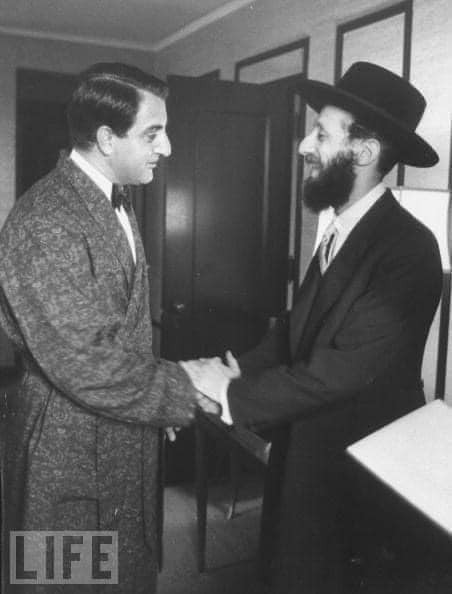
Back in the 50s, Danny Thomas was a major TV star who had a successful comedy series on national television (CBS) called ‘Make Room for Daddy’ (Later changed to ‘The Danny Thomas Show’). The son of Maronite immigrants from Lebanon, read that a young medical student, the son of Chassidic immigrants from Ukraine, was struggling to pay his tuition, and donated the shortfall. As a result, countless lives were saved and made better by Rabbi Dr. Abraham J. Twerski.
Rabbi Twerski described the story in an interview with the Pittsburgh Quarterly on November 19, 2007:
“By that time, I had several children, so my dad and some members of the congregation helped me to pay for school. I applied for a scholarship through a foundation, but it didn’t come through, so in my third year, I fell two trimesters behind on tuition.
One day, I called my wife at lunch as always, and she asked, “What would you do if you had $4,000?” I said, “I’m too busy to talk about fantasies.” She said, “But you really do have $4,000!” I said, “From where?” She said, “From Danny Thomas.” “Who’s Danny Thomas?” She said, “The TV star.”
Then she read me an article from The Chicago Sun. Local officials had told Mr. Thomas about a young rabbi who was struggling to get through medical school. Thomas asked, “How much does your rabbi need?” They said, “Four thousand dollars.” He said, “Tell your rabbi he’s got it.”
Rabbi Twerski was a scholar with feet planted firmly in two worlds — the rabbinic world of Torah and Talmud study, and a medical doctor and licensed psychiatrist. It was a rare pairing that earned him respect in both the insular ultra-Orthodox Jewish world and wider American society. He was an expert on addiction and scion of a long line of prominent rabbis descended from the 18th-century founder of Hassidic Judaism, the Baal Shem Tov.
Rabbi Twerski was a prolific writer. He authored dozens of books on a wide array of subjects: from addiction and mental health to religious law for medical professionals and commentaries on Jewish texts. Twerski also collaborated with late “Peanuts” comic strip creator Charles Schulz on a series of popular self-help books featuring Charlie Brown and Snoopy.
May his memory be for a blessing.
Rabbi Yisroel Bernath
Danny Thomas was also the founder of St. Jude’s Children’s Research Hospital.
113 notes
·
View notes
Text
Cutting Commentary
This drabble is preceded by A Rough Start and followed by Setting the Snare.
Indrid can be a bit meandering, but in fairness, she was in a tricky position: knowing what almost certainly happened, but unable to prove it.
Indrid remains calm after Artair’s presentation. “It is actually miss Lovely’s psiionics that primarily create the nanites, though miss Wistim will assist for custom jobs.
Traditional surgery was not attempted for several reasons: the urgency of the patient’s injuries, lack of knowledge about what anesthetics he might be allergic to, and the desire to minimize his pain as much as possible.
It is terrible when a patient does pay with their life, especially in this fashion.” She admits bluntly.
“It should not have happened. Which is why it wouldn’t have, were it not for a suspected hacking attempt.
Clearly, if Mr. Urtyop saw nothing out of the ordinary, the person using a phone discovered in a trash can, confirmed to be able to hack the nanites by testimony of Xrumon Arigah and Ullane Wistim, must have done it intentionally.
This was no accident, nor was it because of any negligence on my clients’ part. It was intentional sabotage, whether it was witnessed or not.”
Indrid displays said phone, and with it a contained example of nanites to use it on, if evidence of it in action is demanded.
Artair snorts. "Ah yes, the convenient phone found by the defense, which the defense itself testifies to do something that would conveniently exonerate them?"
The prosecutor smirks as he spins on his heel and cleaves through the air with his ludicrous weapon in one easy movement. "Ye grasp at naught but straws, lass!"
The judge purses his lips. "Who is this Xrumon, then?"
"One of the doctors at the clinic, your honorable tyranny," Artair explains, sticking the point of his sword gently into the floor. "Or at least he was. Now he's a patient there - under the care of the defense."
Halvir looks to the phone from the witness stand, blinking in surprise.
"Therefore," Artair continues. “The prosecution objects to both of so-called expert testimonies verifying the capability of this item. One is the accused, the other has a prior relationship with the accused and is not accepted as an expert in coding."
Indrid raises her eyebrows. “We can provide a demonstration if you’d like one. Who would an acceptable expert in coding be?”
"The morgue's Corpse Cutter will suffice." Artair replies, unfazed. "She has considerable experience with it, despite her current occupation, and has no relation to the defense."
"However." he pauses, holding up a hand. "Regardless of any of that - that phone was not located by the legislacerator's office. Not only that, it will take considerable time to locate her and retrieve her in time for the rest of tonight's trial." He looks to the judge.
"The prosecution objects on the grounds that the defense has not proven the phone was even at the crime scene. Since our investigator didn't recover it..."
The feeling of Hovend shrinking lower in his special chair off to the side is palpable.
"...We have no guarantee it is not a complete fabrication dreamt up by the defense."
The judge drags a claw down his scarred and cracked visage, then turns to look at Indrid. "The objection is reasonable. Can you prove that the item in question was used at the scene? Or even present?"
Indrid would points at the relevant security footage, which shows the phone evident in the trashcan after a certain point that night. Clearly someone in the clinic threw it away, and it had to be someone who entered that staff room. Perhaps Halvir even passed them himself.
Halvir shrugs. He wasn't exactly on the hunt for people with cell phones.
Artair squints at the footage for a while. "That could easily be any bally phone," he scoffs, before shaking his head. "But fine, the prosecution will throw ye a shred of mercy and hold to its promise. Jegder!"
The nervous legislacerator bolts out of his seat into a faltering salute at the call of his name. "S-sir?"
"Go'an an' fetch the Corpse Cutter. Lass is prob'ly at 'er hive this time of night."
The judge bangs his gavel loudly upon the banister in front of himself, calling for a trial recess until the expert witness can be located and transported to the court.
After an hour or so, trial resumes session as a greenblood in a scarf is seated in the witness stand. Upon being sworn in under pain of excruciating torture as usual, Artair turns her over to Indrid.
"Miss Tynshu studied under a m'st prestigious program in a variety of coding languages, all verified before 'er employment. Says she did it fer the fun of it."
The greenblood nods. "Oh, yes. It's really quite fascinating just how much damage you can do with a few lines of code. That, or just make some simple games. Either or," she laughs softly.
Artair ignores her.
"Now, miss Tynshu, have you ever met the defense before?"
She shakes her head. "Never. I'd never even heard of the clinic in question before tonight. Well, sort of, I did see a few of their prosthetics come in before, but I only recognize the logo on them now."
"Great, no further questions, yer witness," Artair shrugs, turning back to his seat.
Indrid nods in acknowledgement and appreciation. "Will you please verify the hacking functionality and effects of the phone in question, miss Tynshu? We have a contained nanite sample and instructions from Mr. Arigah about how it turns the nanites into tools of destruction."
Avanti blinks, a bit surprised looking, but recovers swiftly. "That doesn't sound too hard. A bit of a security vulnerability, but..." She shrugs.
The court bailiff retrieves the instructions and items from the defense, placing them on a table where everyone can see the experiment.
Artair watches the events with mild curiosity, while Avanti takes the phone and flips it open. A piece of bread is produced and dropped into a container with the nanite before being sealed. She glances at the instructions, then begins typing into the phone. After a few seconds... Nothing happens.
"Hm? Oh, maybe..." she mutters, getting up from the stand and walking towards the nanite.
When she draws closer, there's a small gasp from the crowd as the piece of bread is suddenly ripped to shreds over the course of a few seconds. Avanti quickly types another few commands into the phone and hastily sets it down.
"That really is dangerous, huh?" Avanti nervously chuckles, smoothing out her shirt as she resumes her seat.
Friday looks miserable, as she never wanted her tech to be used this way. She knows not to speak again, but her ears have been lowered this whole time and now she covers her face with her hands.
Ullane pats her shoulder quietly.
Indrid nods, looking grave. "Yes. It's why I can say for certain this could have never happened due to carelessness. The clinic doesn't even have such commands for the nanites. That is why it was sabotage, pure and simple; sabotage we didn't know was possible, because as stated earlier, the nanites are partially made from miss Lovely's psiionics; her cells, even.
It was thought that the biological element would prevent such a thing. Now we know that is untrue, and miss Lovely has been working on safeguards against it ever since."
Friday takes her hands away and nods slowly.
Artair nods, perhaps in a way that could be confused for understanding. "That's all well n' good, but it still leaves you holding the ball, lass. Ye still put in the blasted thing, and moreover, ye ain't even proved that is what happened."
He raised one finger up on his right hand. "Far as the prosecution is concerned, to say nothin' of the law, it makes no difference. So a phone could potentially be used ta' make your machines go nuts. Ye haven't proved this phone did it, just that any phone could do it. Aye, miss Tynshu?"
"That's right," she nods. "Really, any telecommunication device could do it. A phone is just the easiest way."
Artair nods again. "Plus, if you're arguin' that sabotage was done, well... who did it, then? That's a serious charge you're levyin', an' without a proper suspect, it just sounds like you're flailin' about for a life preserver in a flood."
She acknowledges the statement with a nod. “It is true that it technically could have been any device. However, it is quite likely it was this one, discovered not far from the scene of the death. My client has reason to suspect that the Grey Mob was involved.”
“DNA evidence submitted that was found and analyzed by Miss Wistim from Mr. Interg’s hive led her to assist Mr. Jegder with subduing and arresting one of their agents. The Mob was at odds with her and her previous employer, QPIN Industries.” Indrid states.
"How utterly convenient," Artair drolls, lazily flicking his sword about from behind the prosecution's desk. "The defense collected DNA from the victim's home, analyzed it themselves, and found it to belong to a criminal!"
"Mister Jegder - is this claptrap at all true?"
Hovend startles slightly in his seat, arms nervously raised as if about to have something thrown at him. "Er- I- Yes? We did, uhm. We did arrest a Grey Mob member thanks to a tip..."
Artair snorts. "And yet, despite your claim that the Mob may have had animosity with your client, you have no proof of either that or any proof of the mob's connection with this incident. The prosection again objects that this is irrelevant to the charges."
"Regardless of there allegedly being DNA evidence of a member at the victim's hive, that would be pointless to acknowledge. Criminals can be found anywhere."
Indrid did not respond to Artair’s comments, focusing once more on Halvir.
“Mr. Urtyop, with this new information confirmed by Miss Tynshu, I need you to review what happened that night as closely as possible. No detail is too small to mention; anything might be significant. Who else was with you on the response team nearby? I am assuming this phone had a relatively short range; the saboteur was likely nearby, to use it at all and to ensure their plan succeeded.
It was far more likely to be one of the medical staff than any other kind of worker; they would be the ones who had the knowledge of the relevant radio frequency to hack the nanotech.
How many of them were with you when the client initially showed up, if you recall? What were they doing during and after he was set up for treatment?”
Halvir blinks, looking at the prosecutor. Artair shrugs. "It seems the defense is truly getting desperate. We're re-cross examining the witness?"
He waves a hand. "Go ahead. The prosecution will not object."
Halvir looks back at Indrid, furrowing his brow. "You mean the crash team? Or the other nurses on duty that night? I don't remember everyone's names, but..." he has to scratch his head for a moment in concentration. He then rattles off a few of the names from the crash team that night, along with some of the other nurses that remembers seeing in passing while working.
"When the blueblood arrived initially, there was a whole lot of us around him. He was really messed up. I think at least four or five of us were working on dressing his injuries and intubating him, while miss Wistim was getting the nanomachines ready.
I was hooking him up to a morphine drip to reduce his body's pain response. The others were checking his pupils to determine if he had brain damage, checking his pulse to see if he was suffering blood loss..."
He shrugs again. "After he was stable and had been given his dose of machinery, everyone moved off to their own wards. Of course, we cover each others' wards on breaks as well, so sometimes someone would cover the one he was in while I was on break."
Indrid nods, noting the names down. "Thank you."
"So all of you had an opportunity to be alone with the patient, while the other was on break?" She asks.
"That does create a difficult conundrum, as there was no one unauthorized found on clinic security footage during the incident."
She shakes her head. "The suspect list is broad. Anyone could have taken a break and thrown the phone away. Perhaps it would be best to eliminate trolls who could have done it; ones who wouldn't have known how to administer the nanites once they had been given to the team."
Halvir frowns. "Well, only a few of us know how to administer the nanites, if that's what you're asking. But we all saw who did it, it's not like it was a secret." he explains, listing off the name of the nurse who had successfully administered the machines to the highblood.
Indrid, wearing the barest hint of a smile. "I'm not worried about who administered it directly. It's unlikely, given the hacking method, that the nanites were tampered with before then, and given the time of Mr. Interg's death about half an hour past the injection.
Which is what makes this difficult; the window of time after they were administered but before his death is when it must have happened, as well as the fact that they were likely alone to do it, given that clearly everyone on the team might have had an opportunity for such an act when they were alone with Mr. Interg."
Halvir blinks. "I guess so...?"
Artair coughs. "'Twould be prudent of the defense t' get to the point or ask another question of the witness."
A lean figure stands in the assembled gallery, stumping towards the witness stand.
"This is a farce," the man snarls, coughing slightly as he shoulders his way through the crowd, eyes turning upon him. "We know who did it, quit dancing around the fucking subject-"
"Order! Order!" the judge bellows, banging his gavel on the bannister. "What is the meaning of this? Who are you?"
"Expert witness, patient at the time of death, ex-legislacerator due to medical discharge," he answers, pausing in front of the judge as the prosecutor and witnesses look to him. He keeps his eyes steadfastly on the judge.
"Xrumon Arigah. And that ass," Xrumon continues, pointing a finger towards Halvir. "Is nothing more than a thug for the Grey Mob - Targeting hospitals now? The Mob I used to know at least had standards!"
There's a collective gasp from the crowd, while Artair glares daggers at Xrumon and Halvir's eyes widen. "That will be stricken from the record! You have no evidence for that accusation!"
"Like hell I don't! He was the man on duty, he tossed that phone, and all of this nonsense is because the Mob is too cowardly to deal with their problems on their own! Did you know that the victim was looking into their work in his off-hours?"
"That isn't relevant to the-"
"ORDER, ORDER-"
Xrumon's voice grew louder as he stamped his cane on the ground. "The Mob TARGETS hospitals! They send thugs like him after their targets and put everyone else at risk! We have him on video, he checked the patient and not thirty minutes later he starts getting eaten alive! She might be the person with the worst ethics on the planet, but she doesn't go around chopping her patients apart!"
"Remove that man at once! Bailiff!" the judge yells, another teal surging forward to grab Xrumon around the arm to drag him from the room. Despite this, the man continued to yell.
"IF THE MOB DENIES IT, THEN WHY NOT SAY IT? THEY CAN'T-" The door slams shut behind the two.
The crowd is left muttering in a fervor, many people audibly wondering about whether the mob is truly involved. Suspicious eyes are cast towards Halvir, who looks thoroughly shocked as he wipes a bit of sweat from his brow.
Indrid merely raises her eyebrows as all this happens. Ullane for the first time is wide-eyed and terrified, her hands gripping her legs with such force she nearly bruise herself. Her eyes follow Xrumon being taken away without faltering, gaze fixed on the spot she last saw him.
Indrid doesn’t waste time; moments after the teal is carried off, she clears her throat and speaks again.
“To examine this accusation properly, let us hear from all the other medical staff on duty tonight. We know what time the phone was thrown away; if we hear testimony from everyone about when their breaks were taken and who was alone with the patient at what time, it should be a simple matter to deduce who the true culprit is. As to whether they are Grey Mob…”
She pauses meaningfully.
“...remains to be seen.”
Xrumon is a fascinating troll. It is why I have chosen to help him.
Even if I feel his attentions are sometimes misplaced.
1 note
·
View note
Text
Personal Passions & The Waves They Ride

Based on a body of Natural Health Journalism. Hosted by Holistic Wellness Journalist and Radio Broadcaster, Catherine Skye Knott.
To Nurture and Understand the Frequency from Within. Discussing Natural Therapies and a broad range of topics related to our Environmental and Energetic Relationships. The Mental, Physical and Philosophical. The Nature of what makes us who we are. Featuring Commentaries, Insights and Interviews with Practitioners, Doctors, Experts and Enthusiasts around the Globe • Tuesdays at 2pm
#radio show#nature lovers#natural health#Holistic health#health and wellness#wellbeing#holistic health practitioner#holisticwellness
2 notes
·
View notes